The Cheese Heads (1991) #1-5 by Nick Craine
Let’s see whether I remember how to do these blog posts… it’s been a while.
Err… is that white balance correct? Perhaps it was a mistake to use a green background here…
But let’s read the first four pages together.
So, OK, very mysterious. And this seems to have been drawn for a different form factor — looks magazine format-like, so you get these huge borders at the bottom.
I did not read this series at the time. First of all, I was at university, so I couldn’t really afford to buy everything I wanted to read. But second: I didn’t want to read this, because I assumed that it was yet another unambitious book based on the name, which reminded me of:
The infamous Rock Heads from Solson Publications, done at the height of the Black And White Boom And Bust.
I know, that’s stupid, but that’s life for you.
Hm… I think I have to adjust the light when I’m taking these snaps… but I’m too lazy to redo these pics.
Anyway, this starts off pretty well? We get these mysterious cheese head characters, and they’re on a mission, and there’s intrigue. And the artwork is engaging — it’s got that 90s indie thing going on, but also has echoes of, like, Rick Geary? And also… I’m getting Mauretania Comics vibes? Which are the best vibes.
It’s got that oblique way of moving from panel to panel, where things connect somehow, but tentatively.
Tragedy Strikes would publish Reactor Girl, but here it’s advertised as being published by Extra Small Press? Which is true! Huh; didn’t know about that… I think I’ve gotta try to find that.
Angst-ridden and post-modern. Right.
I’m not sure how much of this book was planned, but my guess would be “not a lot”. It flows from one non sequitur to the next more than anything.
But there’s also these pretty gruesome scenes. I wonder whether the inspiration is more from other comics like Flaming Carrot than from movies and literature?
Craine tries to do a lot of different things over these issues, and not everything is quite successful. Like this spread where a bomb goes off. It’s cool the way the panels fall from the sky, but it doesn’t really read “explosion”.
I’m also starting to wonder whether Craine is a Cerebus fan.
It’s not all Cheese Heads. Each issue has a few pages of the God Is A Plain Clothed Man serial, which is a lot less goofy than the main series.
And look who shows up in a back-up feature: Carol Swain! Her artwork is really badly reproduced, though.
There’s a call for submissions for Reactor Girl, which is now being published by Tragedy Strikes. The theme is the modern urban environment.
Yes… Cerebus.
Hah! Craine even namechecks Gerhard, and that wallpaper does look kinda like somebody’s trying to do a Gerhard wallpaper. But I guess Craine is Canadian? So it’s natural that he’d be reading Cerebus…
Like I said, Craine sure tries a lot of different things, and that’s entertaining, but often it’s just kinda unclear what we’re meant to see. Here the cop on the bike seems to have a bright explosion in his chest… but is that because that cheese head shot him? (Spoiler: No; he was apparently pulled to… heaven… or something.)
Ah — Craine had previously done two years of Cheese Heads strips for a student newspaper. And the plan was for Cheese Heads to run at least 20 issues.
Ah, the colours on the first issue weren’t supposed to be out of register like that…
I guess that explains why they did a second edition of the first issue (but I don’t have that one).
And then the cheese heads encounter a very tiny man, and the cop is in heaven. Honestly, at this point I thought it seemed like Craine had rather lost interest in the book — there’s a difference between inspired oddness and “eh, whatever”, and this seems a bit on the “eh, whatever” side.
Nice joke about dramatic lighting in TV series, though.
In the fifth issue we get a guest appearance by Dishman by John MacLeod. And basically nothing of interest happen, but they probably had fun collaborating?
And then the series end in the time honoured comics way: With a box saying “Continued…”.
Was Pickle to be Black Eye’s most celebrated title? They published so much good stuff (if I remember correctly) that I guess the competition is stiff. Perhaps Berlin?
Oh, the Crash magazine was originally to be published by Vortex Comics?
It was published by Drawn & Quarterly instead (and only lasted two issues).
OK, that’s it for The Cheese Heads. It’s very much one of those series somebody straight out of art school would make — there’s a lot of references, there’s some poetry, there’s a lot of Lynchian mystery floating around… and there’s not really a lot of direction.
But it certainly shows promise — and it is a pretty good read.
Comics Scene CSV2-029, page 13:
Mafia widow with a nuclear
device hidden in her leg? A
tiny Barney Miller lookalike
living in a car glove compartment? A
government agent with the words
“CIA” etched into his forehead?
Hopefully, the average comics reader
hasn’t met many people like those
who inhabit the twisted world of The
Cheese Heads, published bi-monthly
by Tragedy Strikes Press.
This series, by 20-year-old cheese
wiz Nick Craine, originated as a
comic strip in Craine’s native
Ontario, Canada.
“It began as a strip for The Ontari-
on, the University of Guelph newspa-
per,” says Craine. “Guelph is sort of
the sound of wet cement with your
shoe in it. The strip was originally
based on angst-ridden university stu-
dents, and it has grown from that
loose premise. It was a gag strip that
now has a dark, morose feel.
“The phrase ‘cheese head,’ ”
adds
Craine, “is considered an insult to na-
tives of Wisconsin, the ‘Cheese State.’
I took it quite literally and designed
three characters with cheese for
brains.
Once Craine decided upon the di-
rection for The Cheese Heads comic
book, he reworked his three nameless
title characters, whose personalities
vary from contemptible to timid to
asinine.[…]
it seems The Cheese Heads tread
far from the path taken by most
comics, it just may be due to the
array of influences behind it.
“Dan Clowes’ Eightball is a really
nice piece of work,” says Craine. “All
the good things that can be said about
it have already been said. I started
reading Robert Crumb over the last
two-and-a-half years in Fantagraph-
ics’ reprint books. I love Monty
Python’s Flying Circus, but I don’t
think I could duplicate that humor.
It’s so original, it can’t be imitated.
Bob Burden’s Flaming Carrot ICS #2
& #211 is probably one of the first
indie books I ever picked up. It was
too weird to be true! IVackiness for
wackiness’ sake!”
As Craine began publishing his
own series, he made an effort to learn
more about comics history, which, he
says, “was like discovering a whole
new world.” But it was a fellow
Canadian who provided the jolt he
needed to get his ideas from his head
to paper.
“What really got me into doing
comics in the first place,”
says
Craine, “was Dishman, about a ninth-
grade history teacher who has the
power to clean dishes by telekinesis.
He looks for crime to battle and
instead finds young kids smoking and
tells them what a bad habit it is. It
comes off beautifully. The book is by
John McLeod, who’s also from
Guelph. Here’s a guy in my home
town publishing his stuff for next to
nothing. John’s a real inspiration.”
Rich Kreiner writes in The Comics Journal 161, page 101:
Michael Allred (creator of Grafik Muzik
back then and Madman Adventures right now)
is more fond of Nick Craine’s The Cheese
Heads than I. Allred notes the excitement of
“story and art brought together in one clear
vision” and “its unique style vibrating raw
energy.” As these are attributes One might well
ascribe to Allred’s own work, the approbation
deserves some attention since it could indeed
take one to know one.
I can’t quibble with anything that Allred
says specifically. It’ s just that I prefer
my clear visions and style vibrating
raw energy with a surer sense ofdirec-
tion and purpose— as in Allred’ s own
material — than has thus far been
revealed in the five issues Of The
Cheese Heads.[…]
Things often pick up, however, when the
stars aren’t around. Certain scenes, especially
later in the run, are marvelously choreographed:
issue #3, which sports a terrific cover, has an
exquisitely paced sequence in which a Cheeser
reveals himself. In fact, there’s sufficient op-
portunity to believe that the book is materially
advancing. Whetherbycreativechoiceorreader
acclimation, the fathomable seems to have eS-
tablished something of a foothold. Issue #5,
with another great cover, is the run’ s high point,
likely no coincidence as it features the “most
explosive crossover event Of a lifetime” when
the Cheese Heads mooch a cigarette from John
MacLeod’s Dishman. Several issues have also
featured snippets of Craine’s “God is a Plain
Clothes Man” which is steeped in atmospheric
observation; progressing at a rate slightly slower
than the Cheese Heads’ road show, it has yet to
gain momentum. (Craine does prosper under
the rigors Of collaboration, as evidenced in
Reactor Girl #3’s “Still Life,” where he is
guided by author Sylvia Markle-Craine, his
mom.)
Wizard Magazine 025, page 114:
Art Director Nick Craine is the creator of what can
probably be called Tragedy Strikes’ flagship title, The
Cheese Heads, despite many aspects that would apparently
make it an unappealing comic. It is the one Tragedy
Strikes comic that is not directly related to mini-comics
(although it has featured a guest appearance from Dish-
man), and it is the company’s most distinctive and rec-
ognizable title. The Cheese Heads is a bizarre, surreal
road trip featuring three nameless characters who liter-
ally have cheese for brains! Despite these unconventional
qualities that would seemingly detract from the comic’s
appealability, The Chæse Heads is one of Tragedy Strikes’
more accessible books.
I don’t think this series has been collected.
[Edit some months later:]
I couldn’t resist tracking down the second printing of the first issue — the original cover had been misprinted, so to make up for that (or something), a new version was printed a year later. I can’t imagine that made any sort of business sense — surely they wouldn’t expect to sell more than a handful of copies of this? But perhaps they just wanted to have a nice set…
But the series was cancelled with the fifth issue anyway, and nothing was resolved storywise, so it’s not like there was a “set” to sell anyway. (But they probably didn’t know that the series was going to be cancelled when they did this…)
So we get new covers, and two new pages that explain how this series came to be. And these two new pages sort of recap the entire series, too…
And then a new pinup.
And a back cover by Michael Allred.
So that’s all very nice and stuff, but like… uhm…
OK, I’m done.
This blog post is part of the Total Black Eye series.
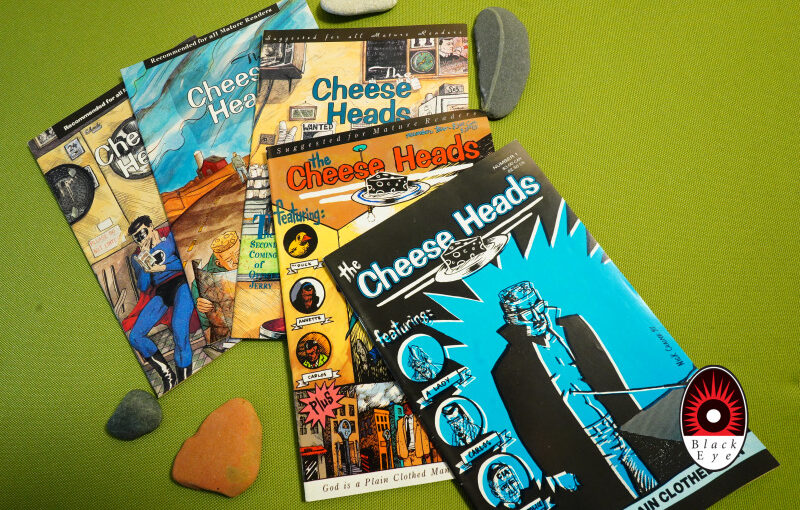
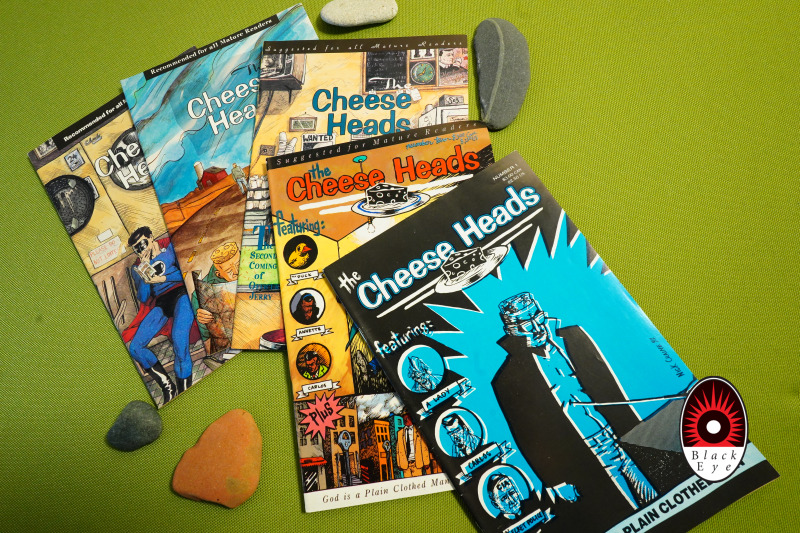
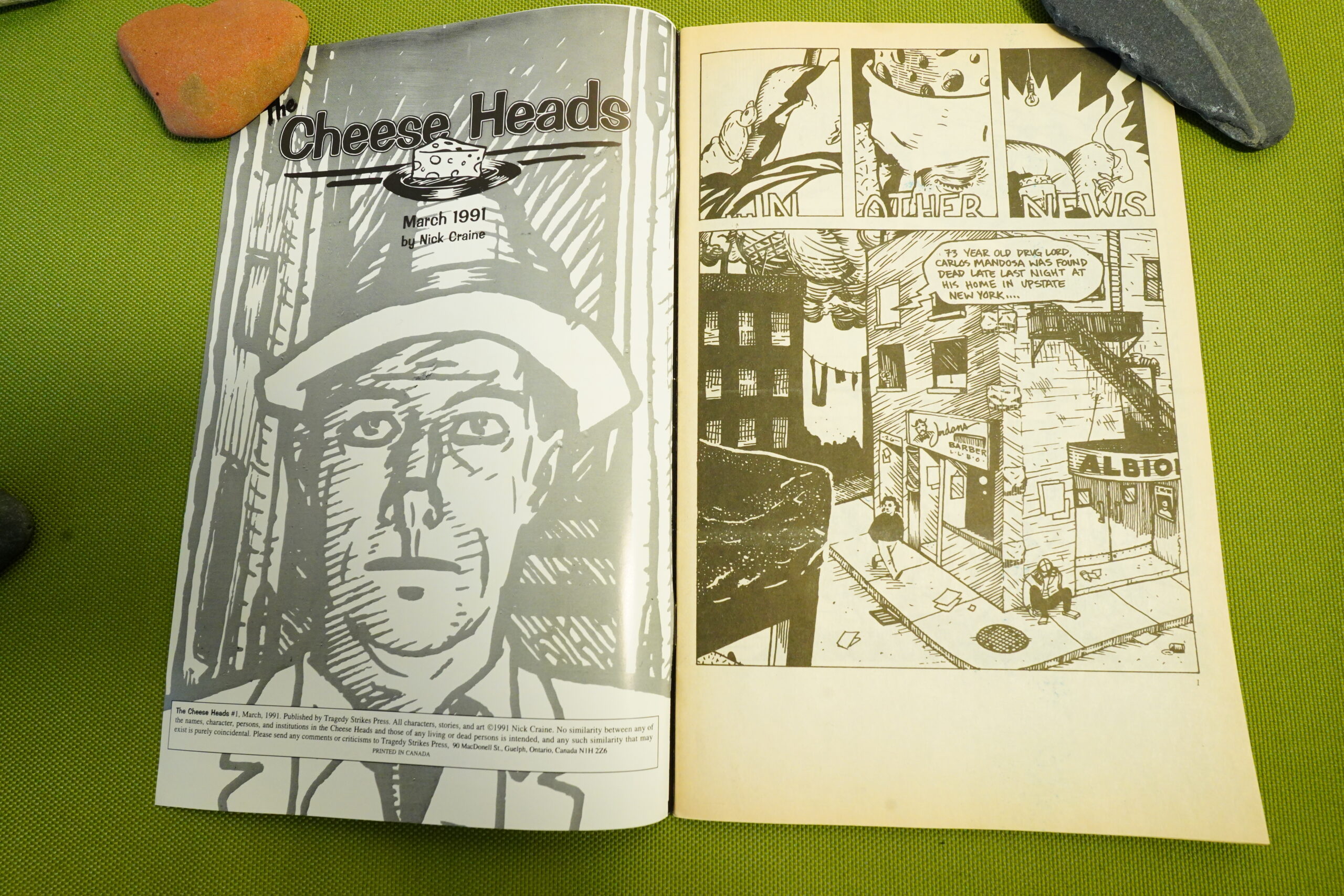
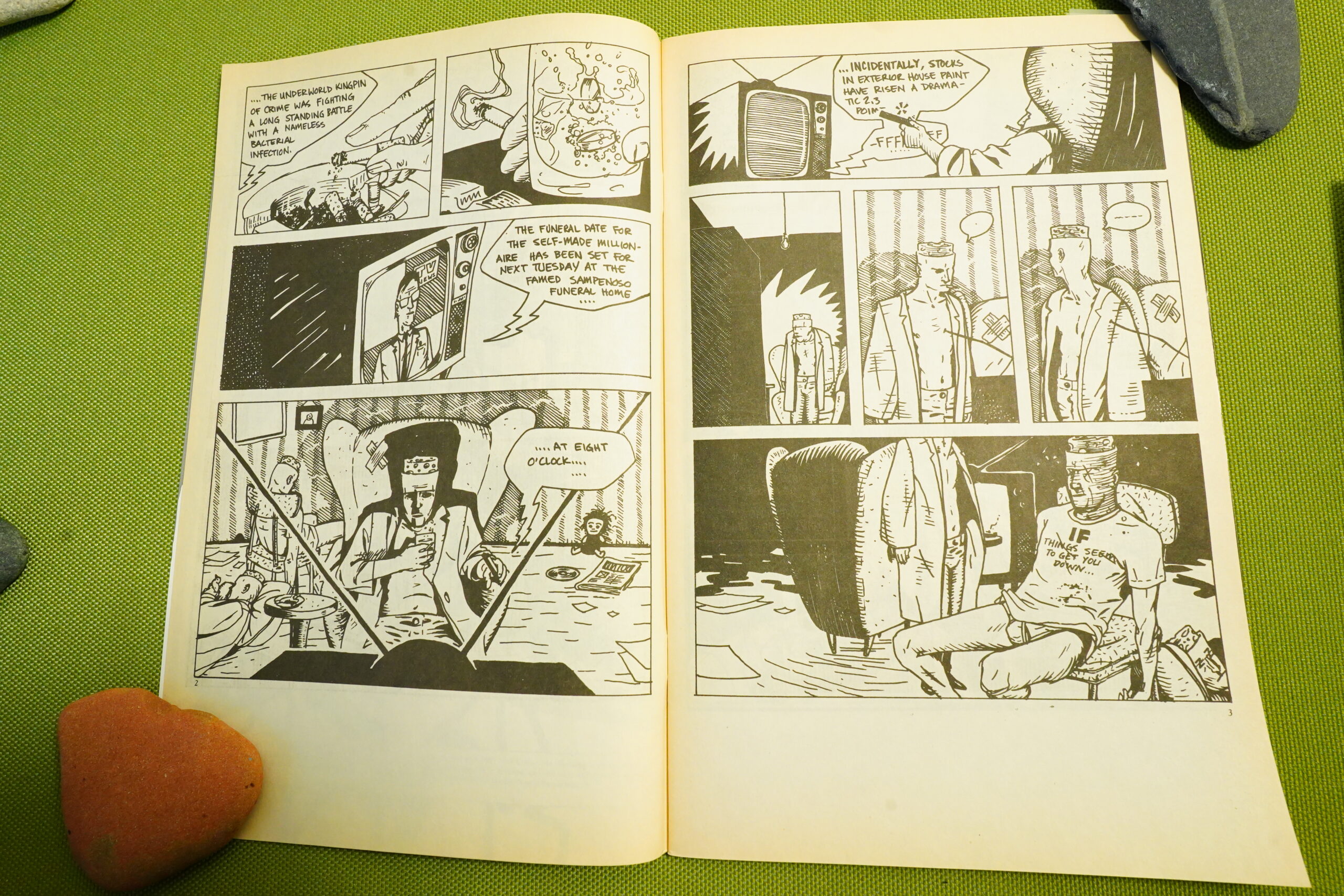
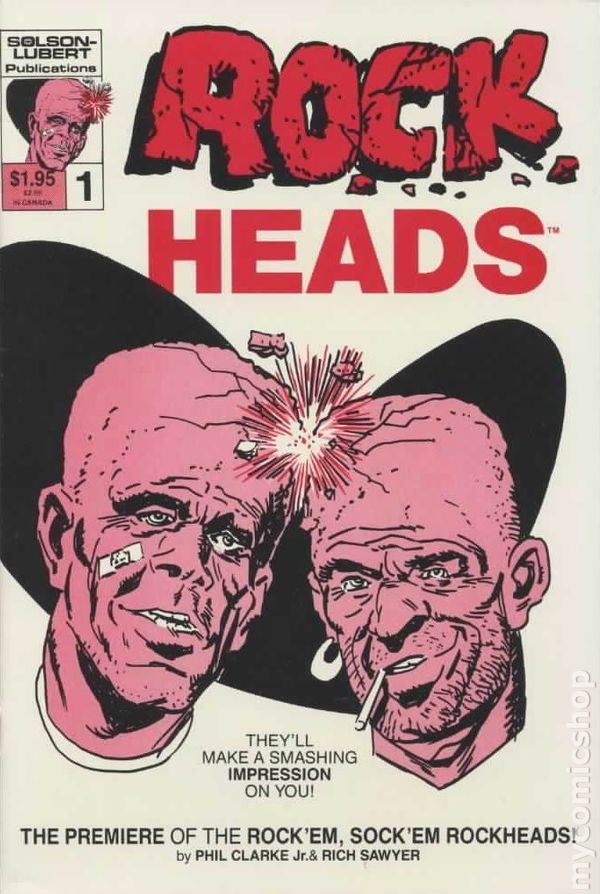
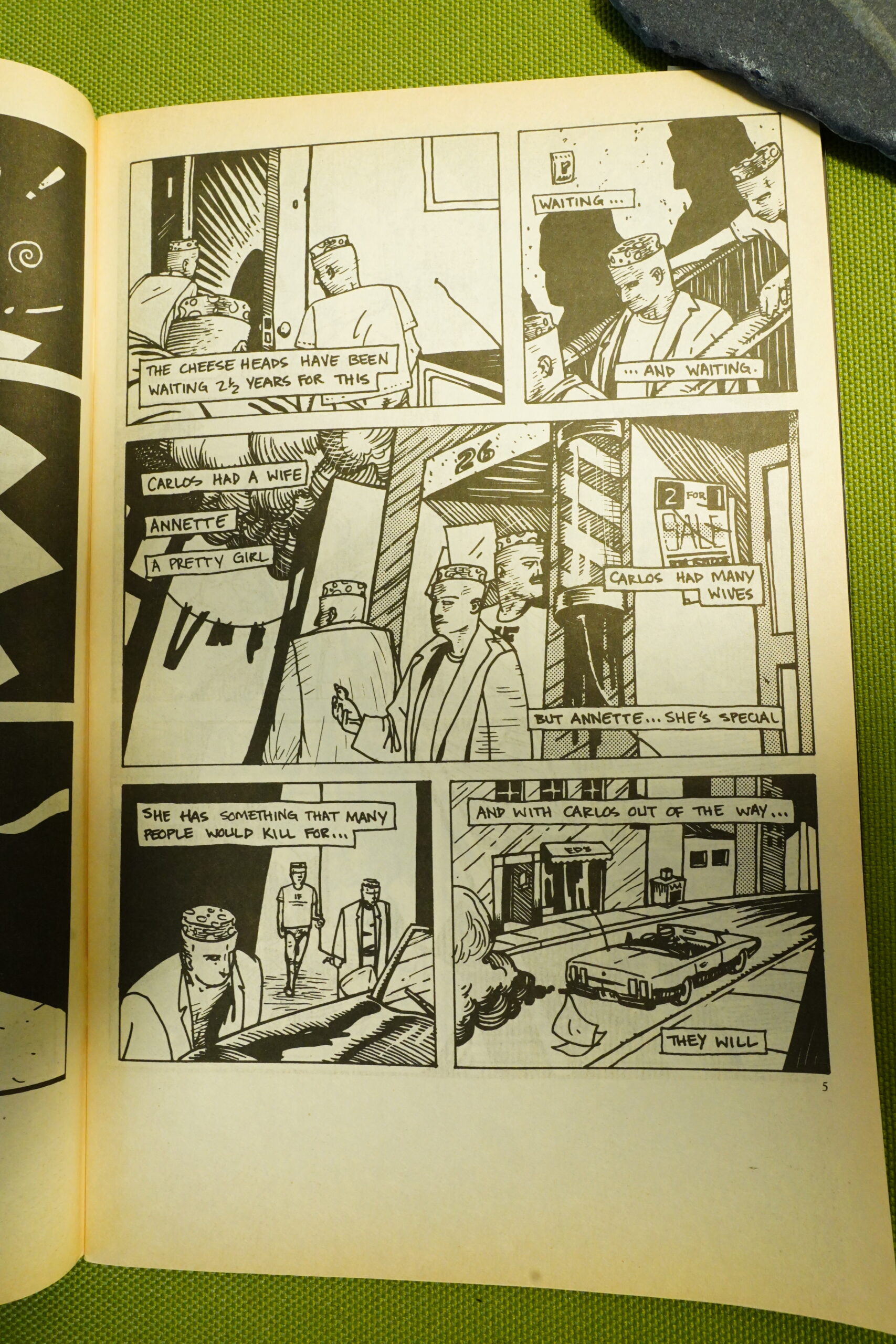
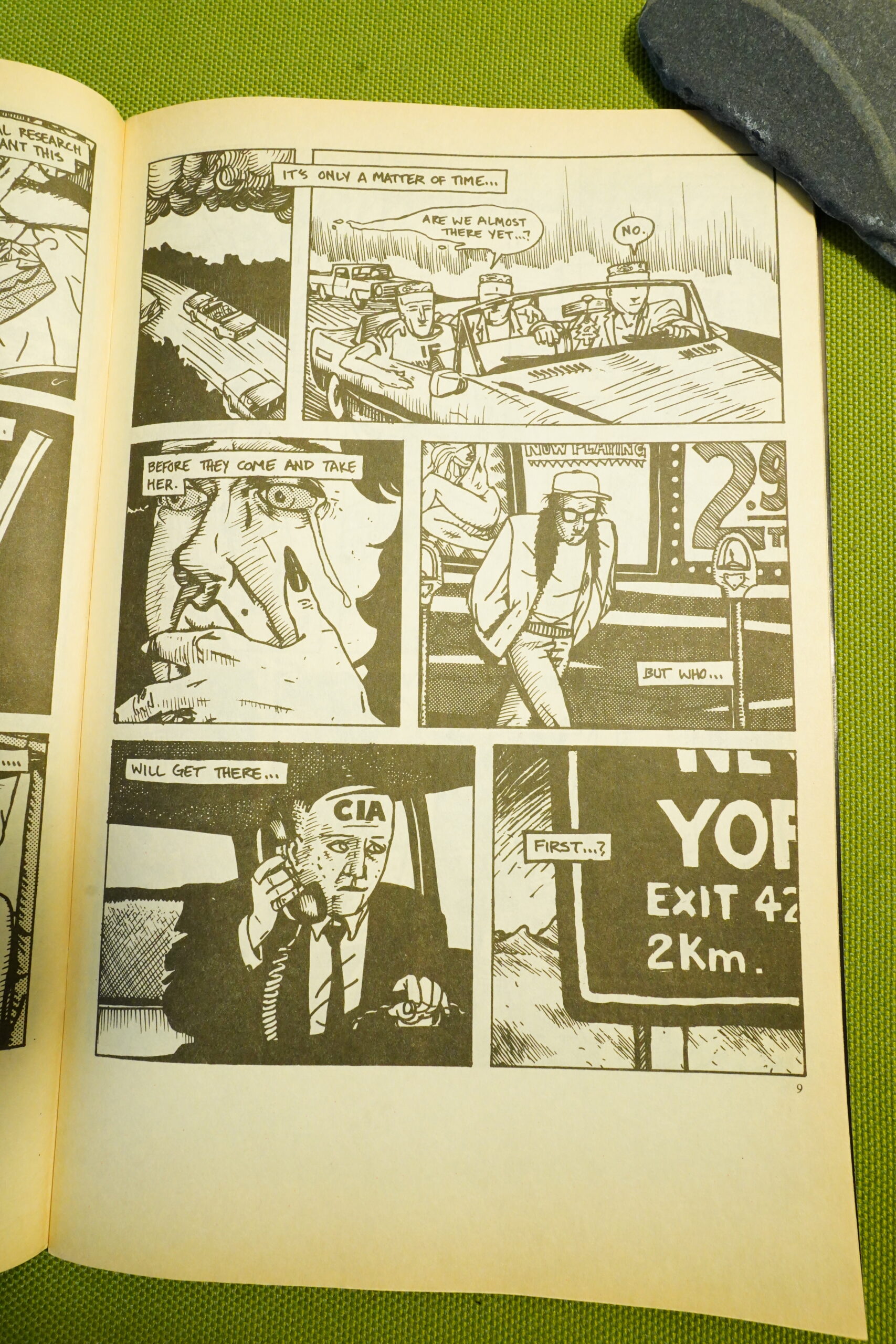
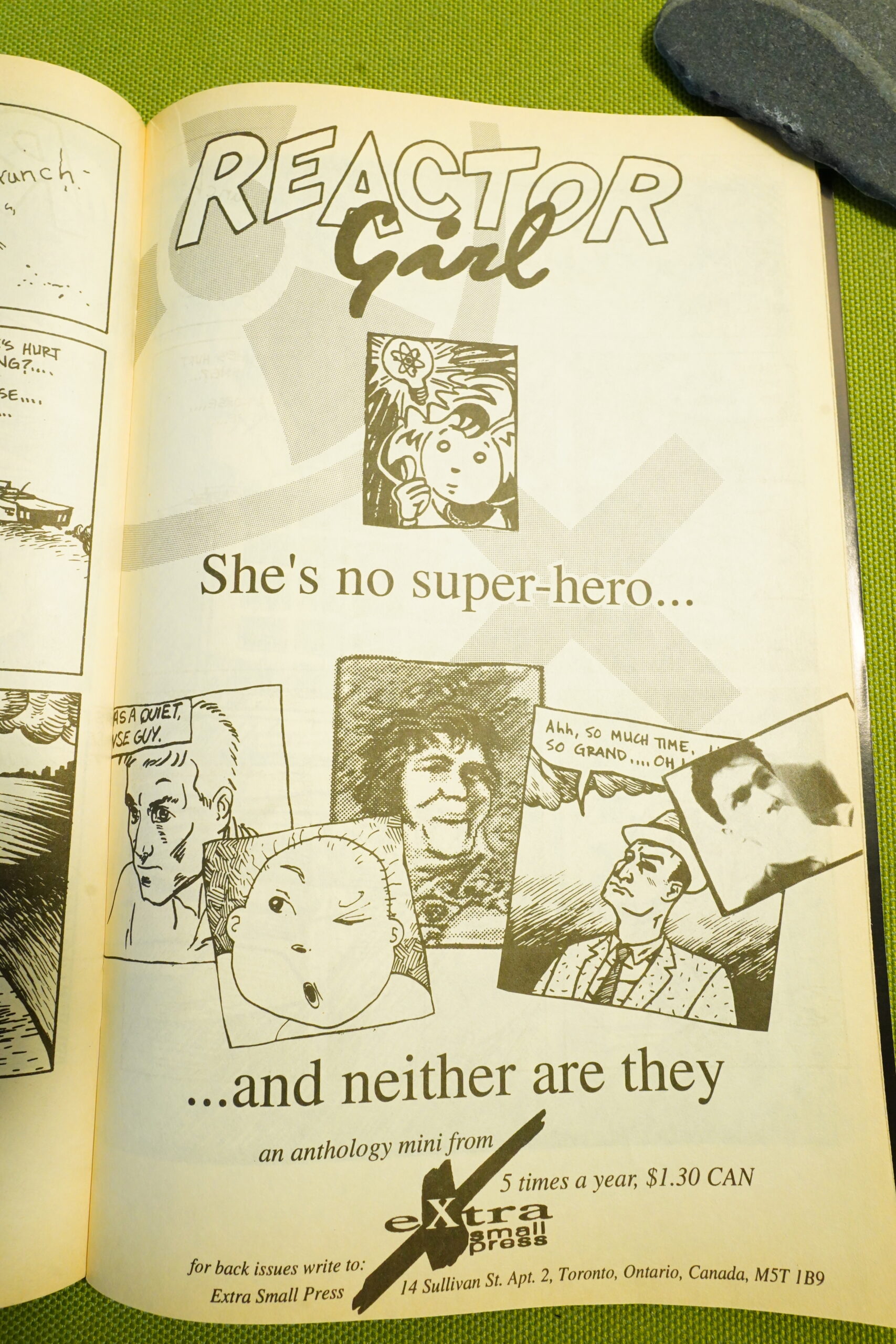
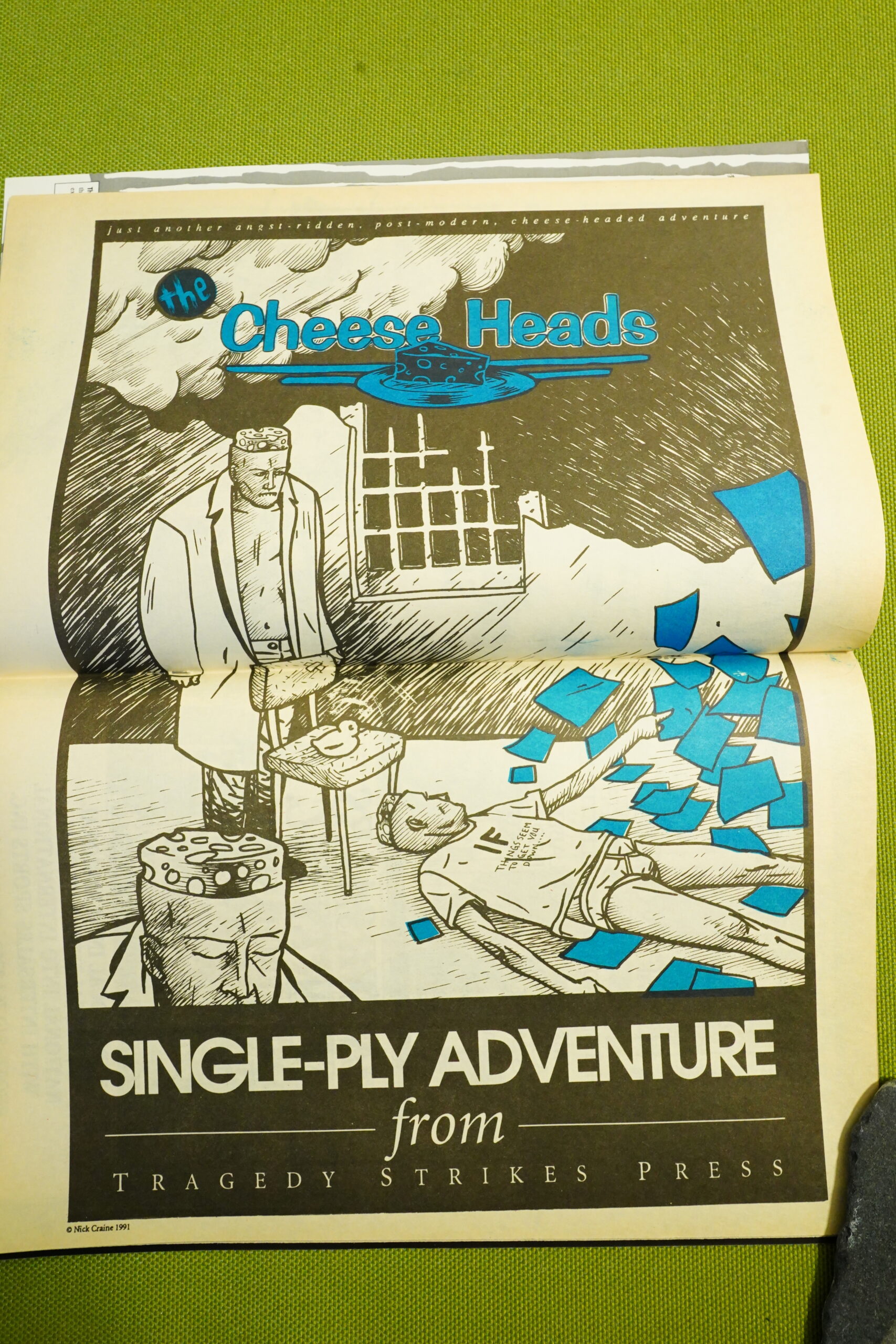
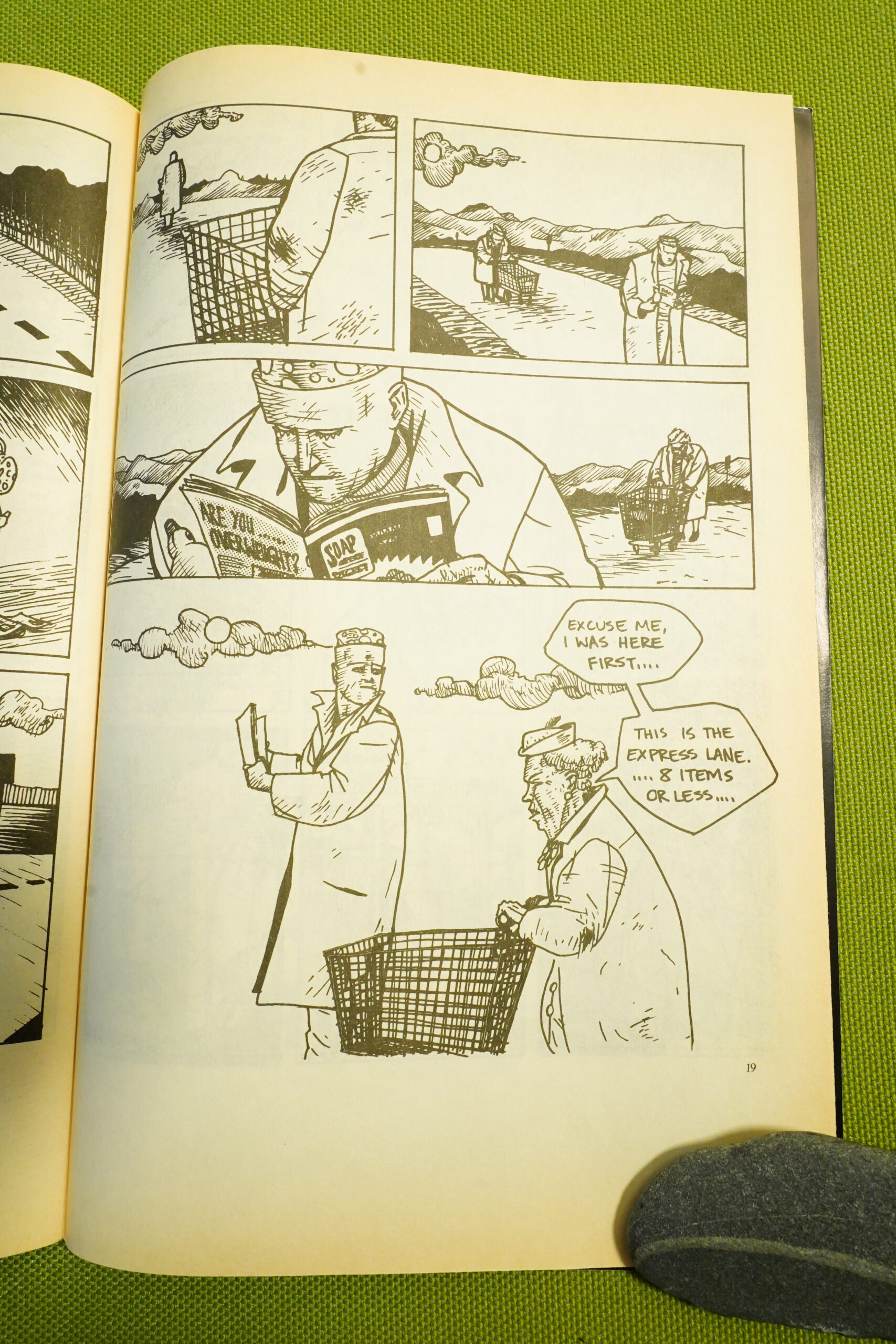
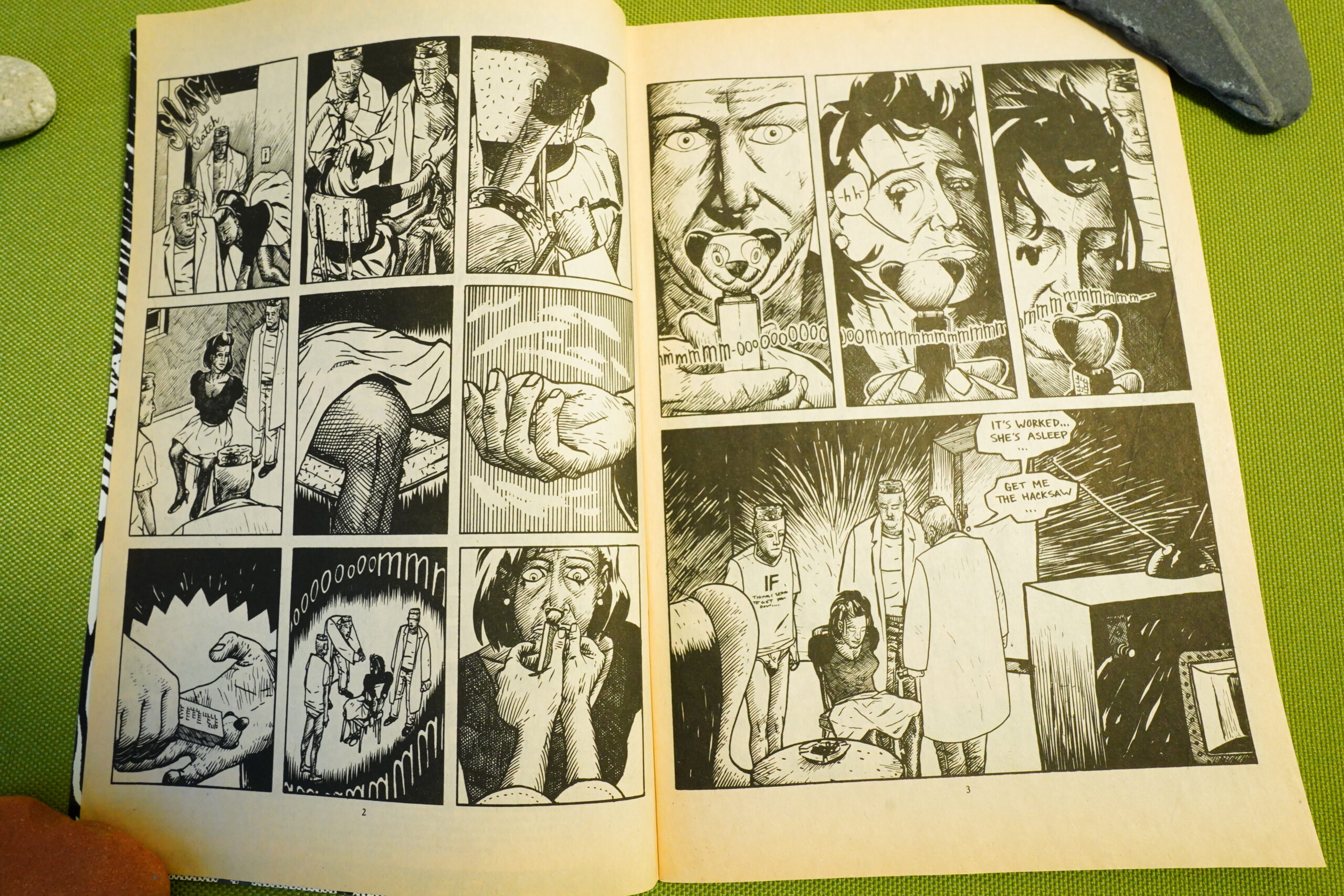
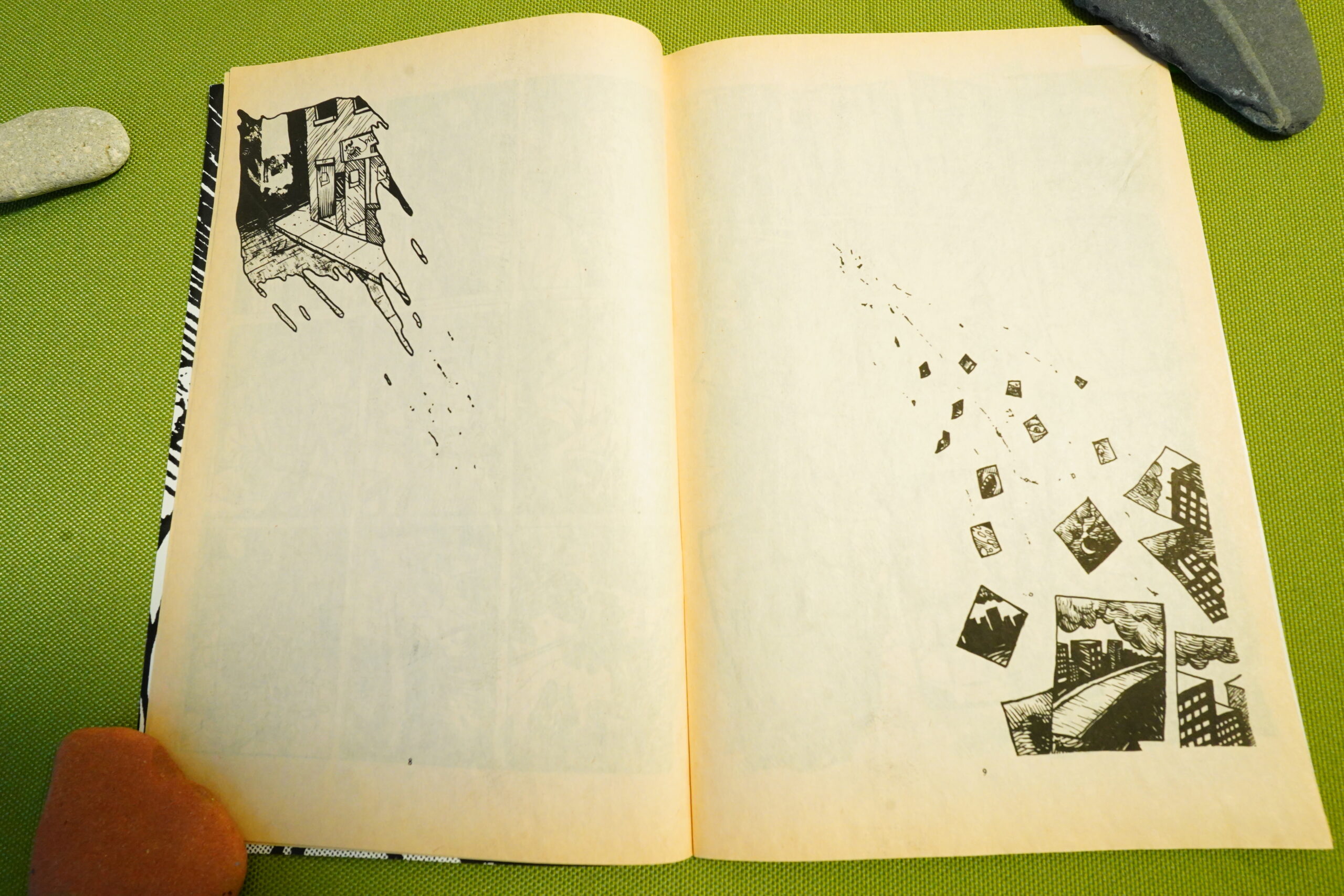
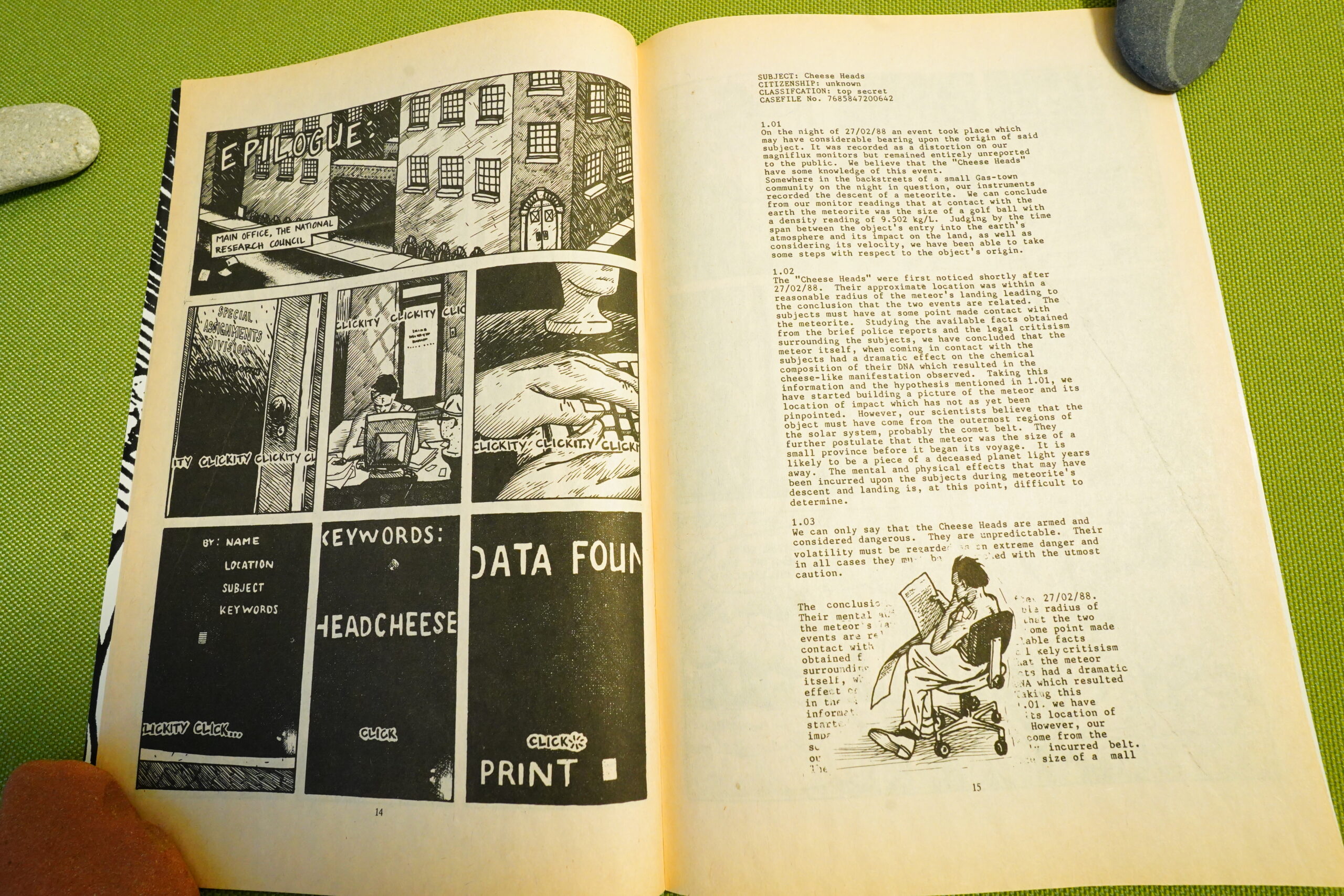
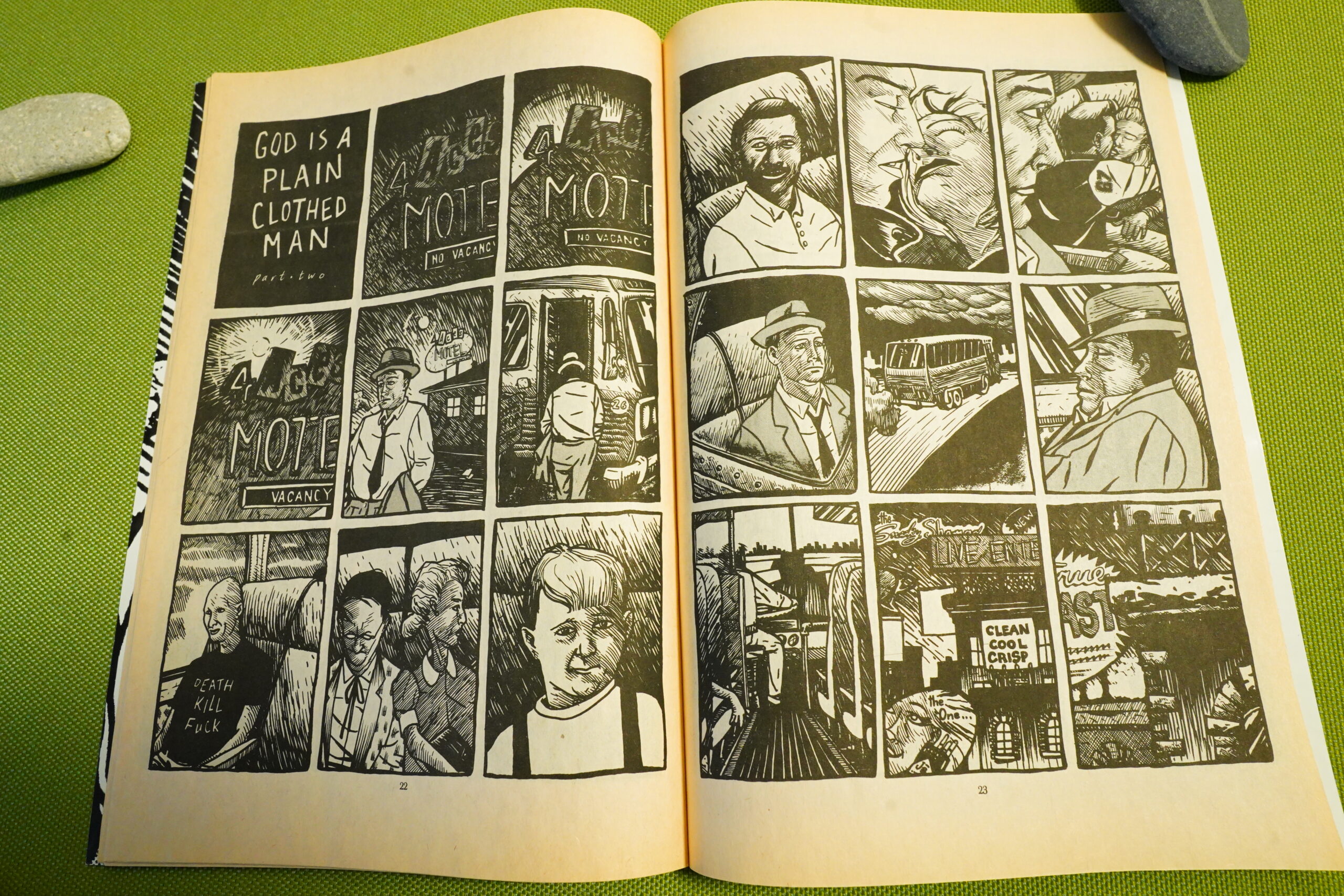
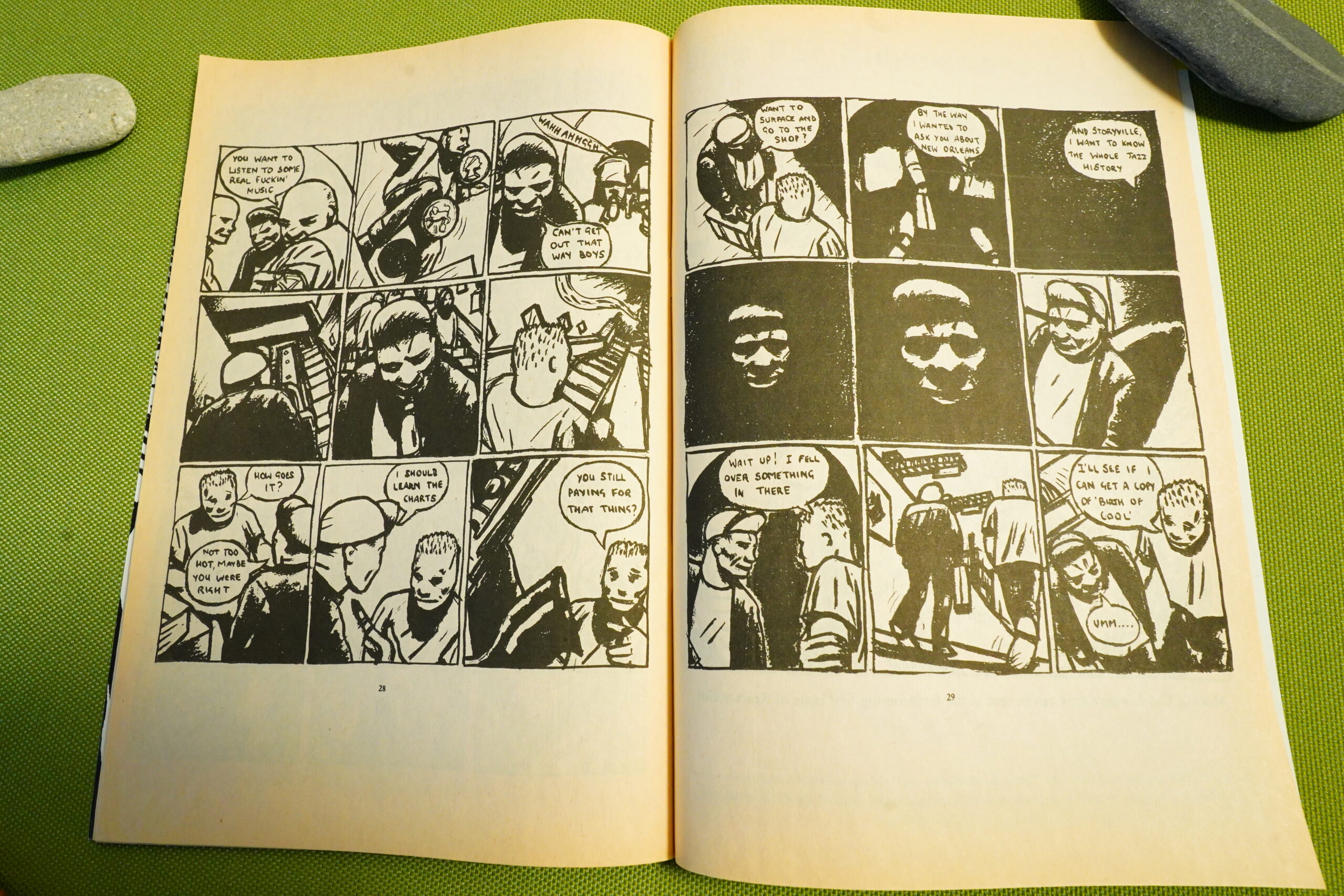
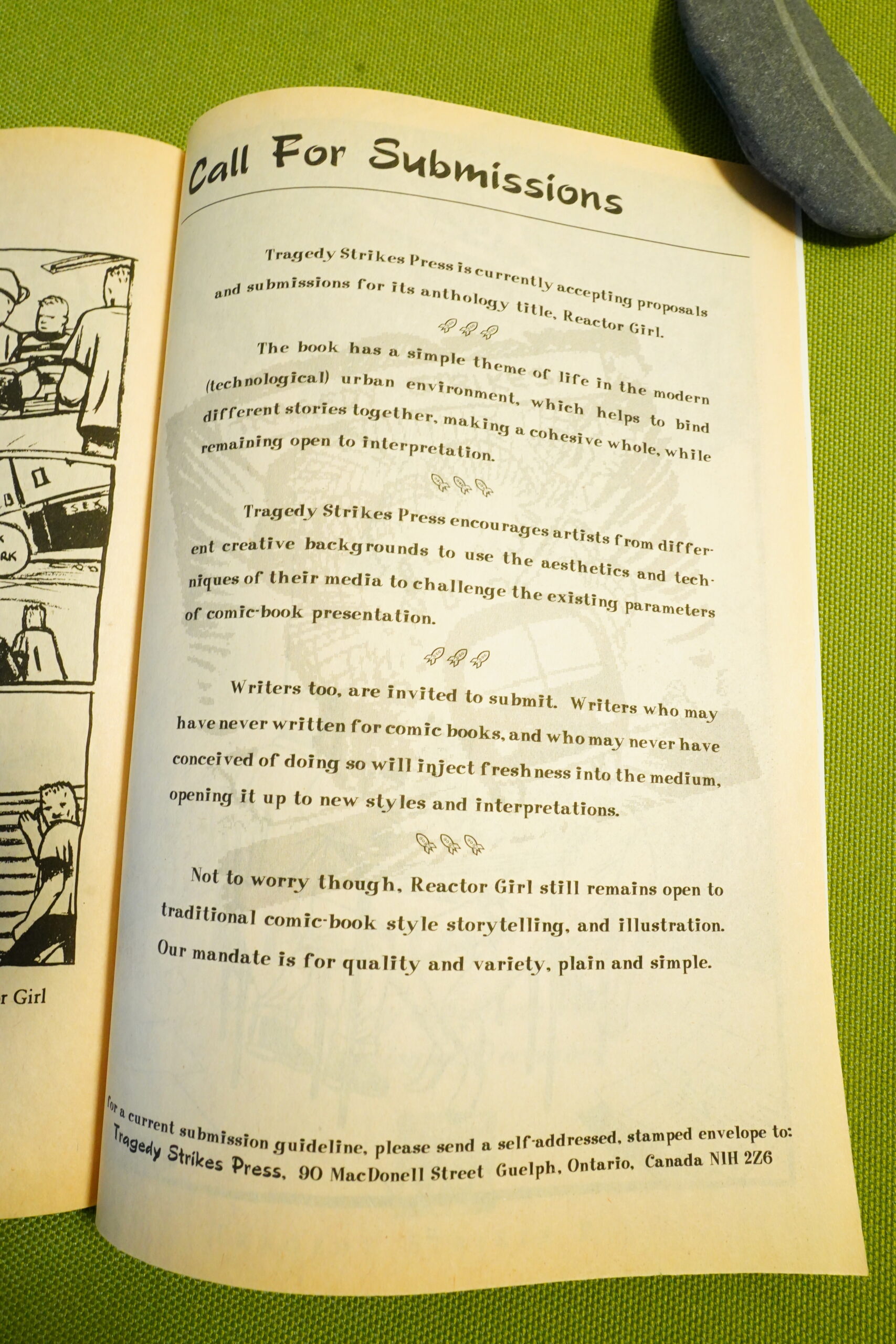
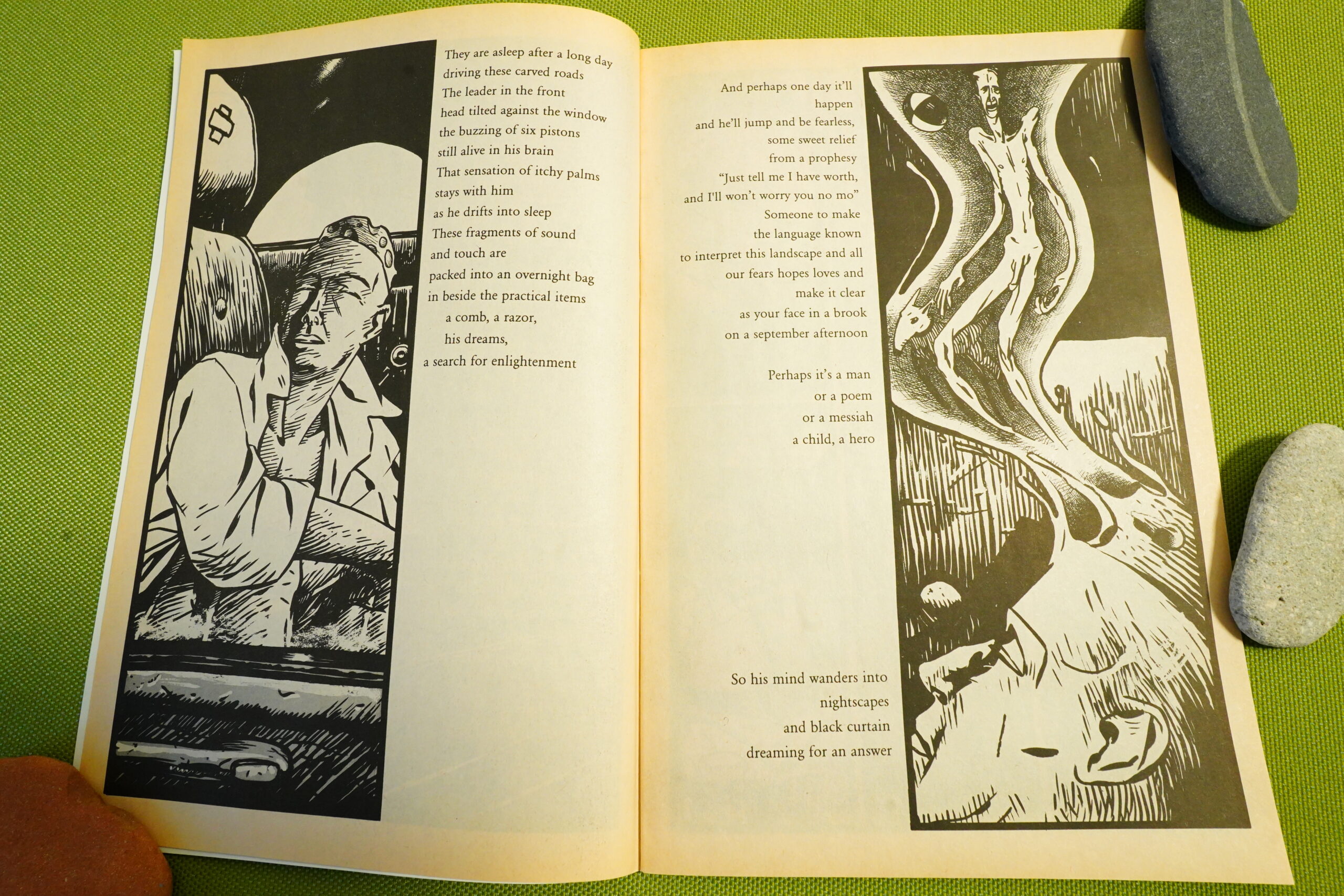
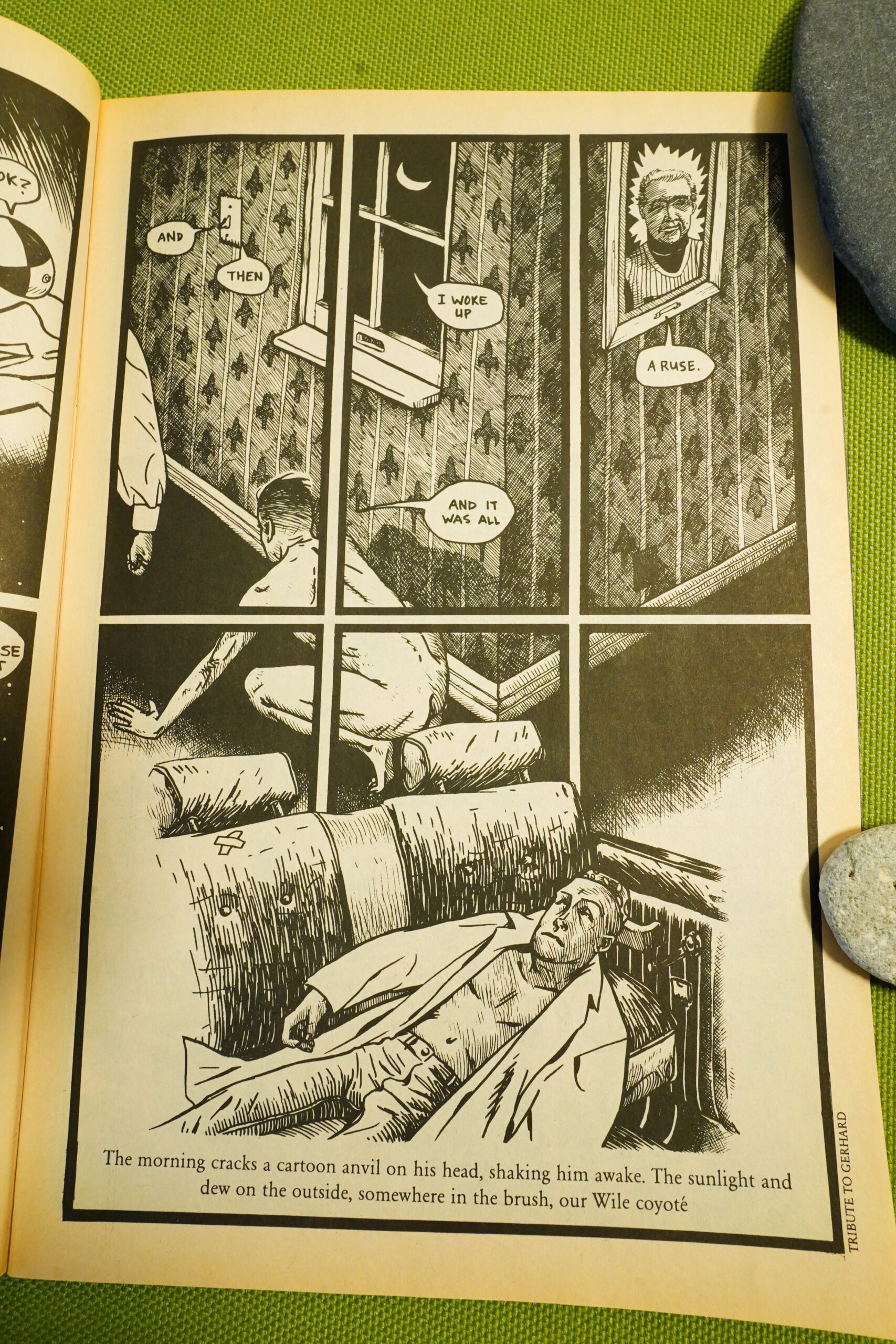
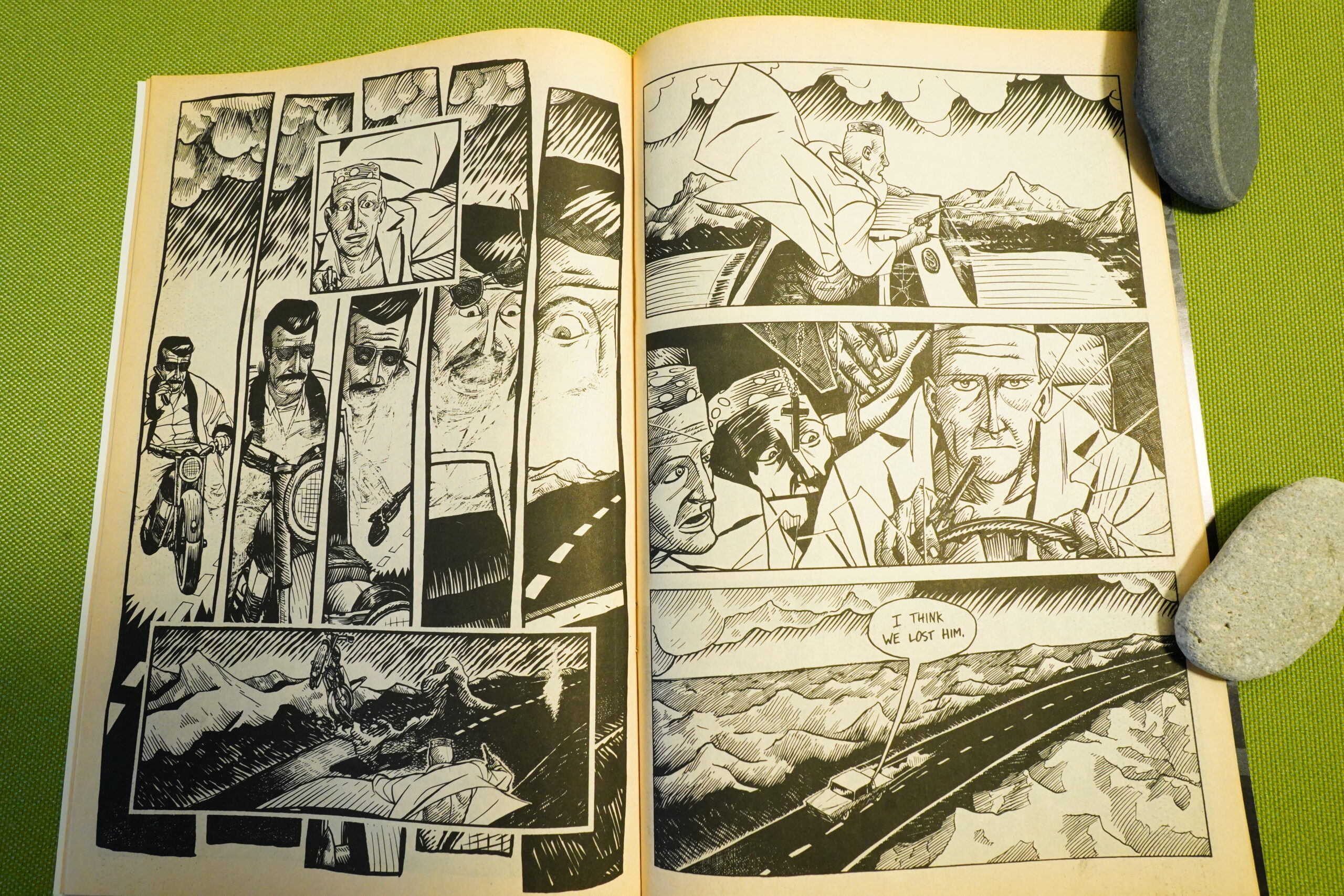
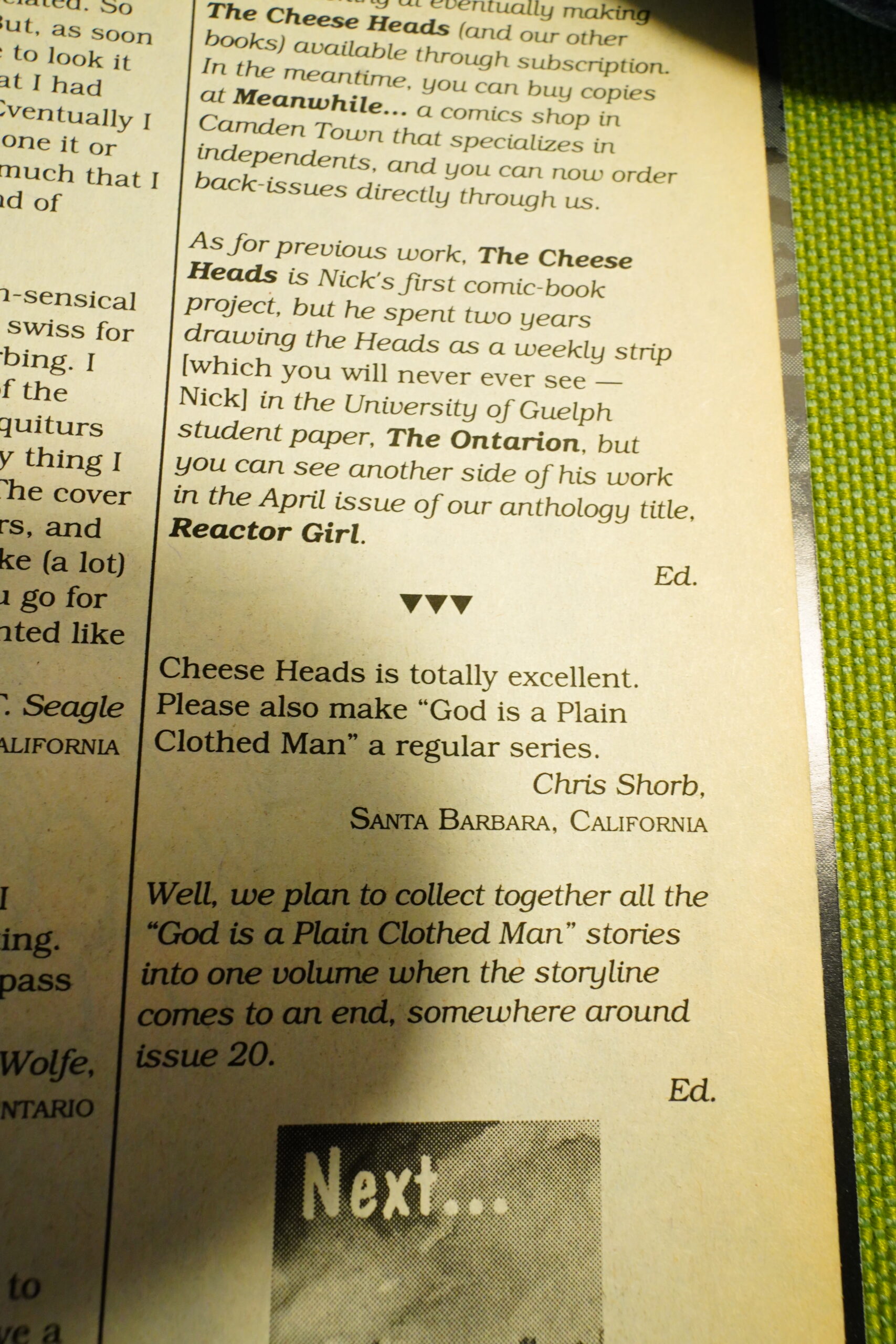
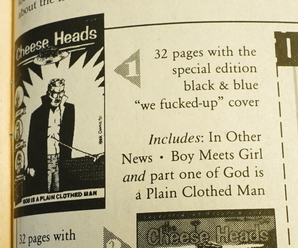
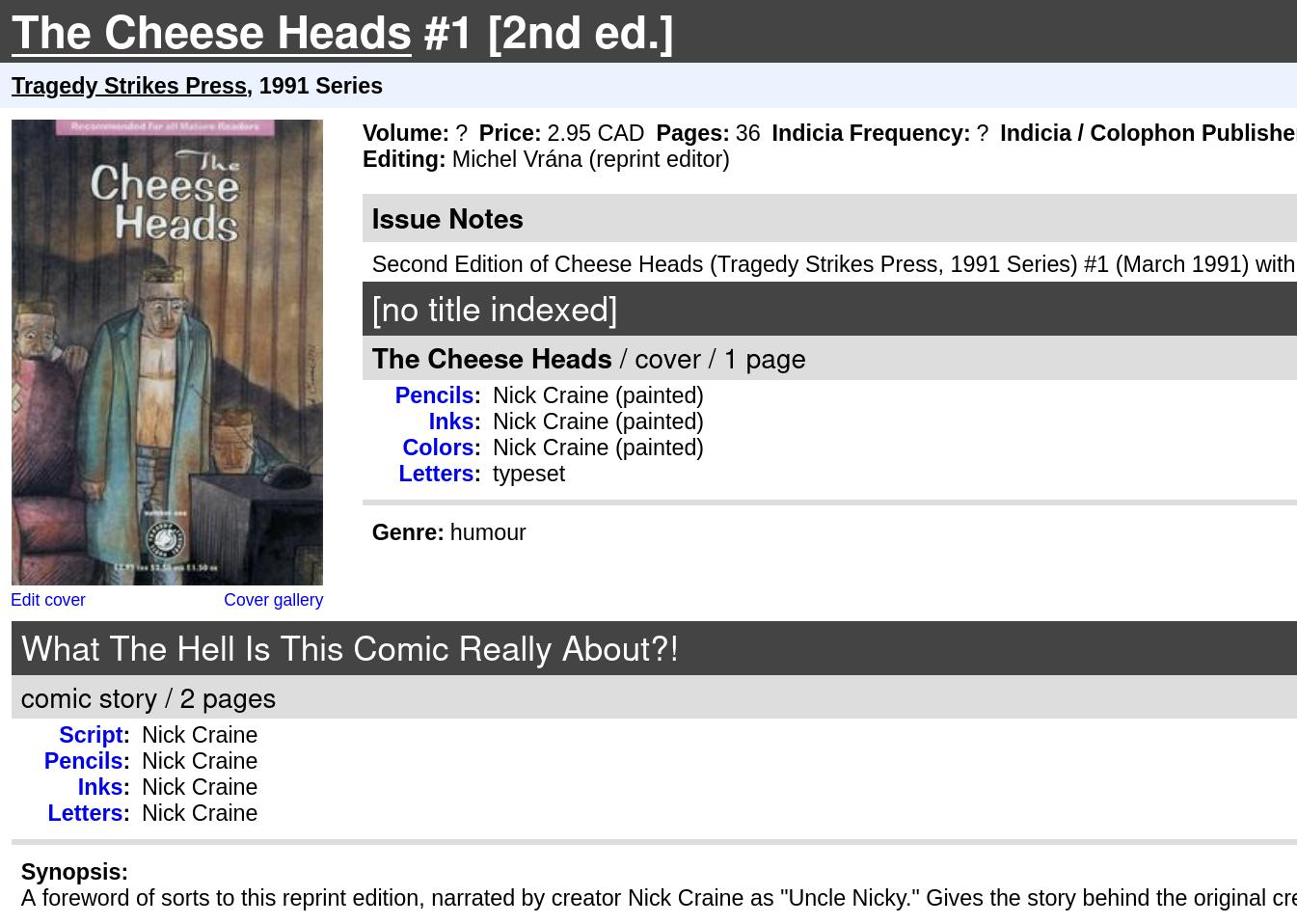
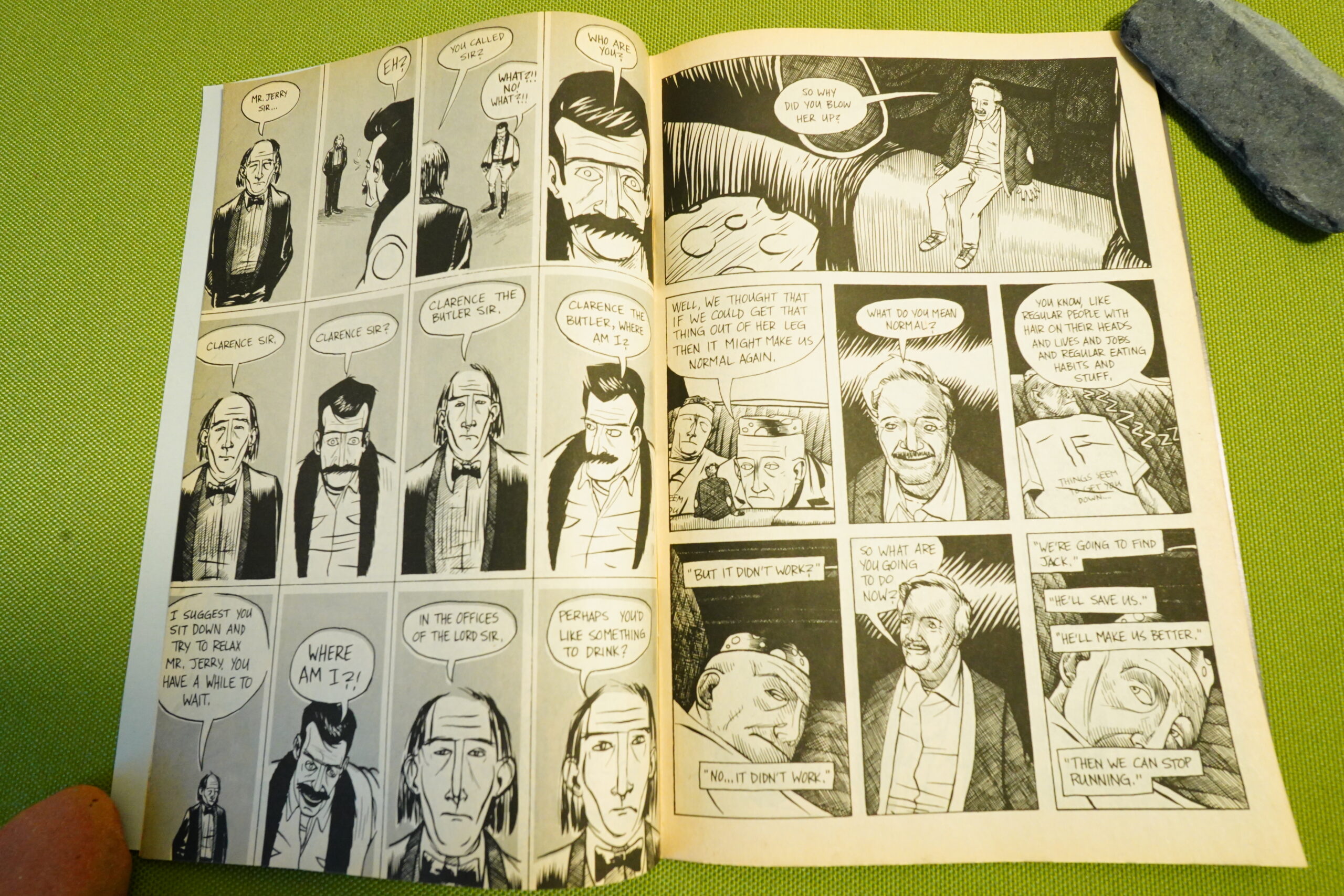
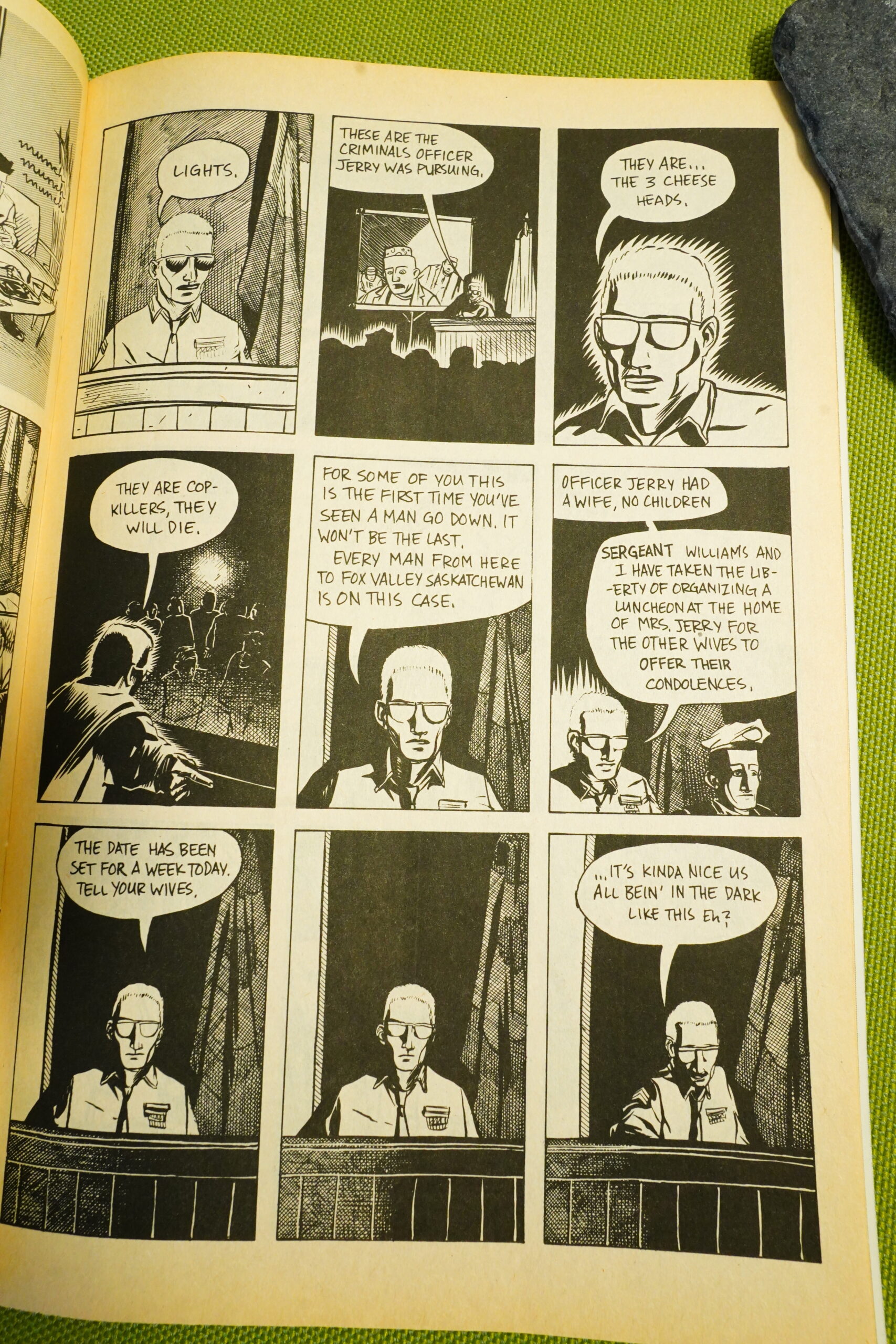
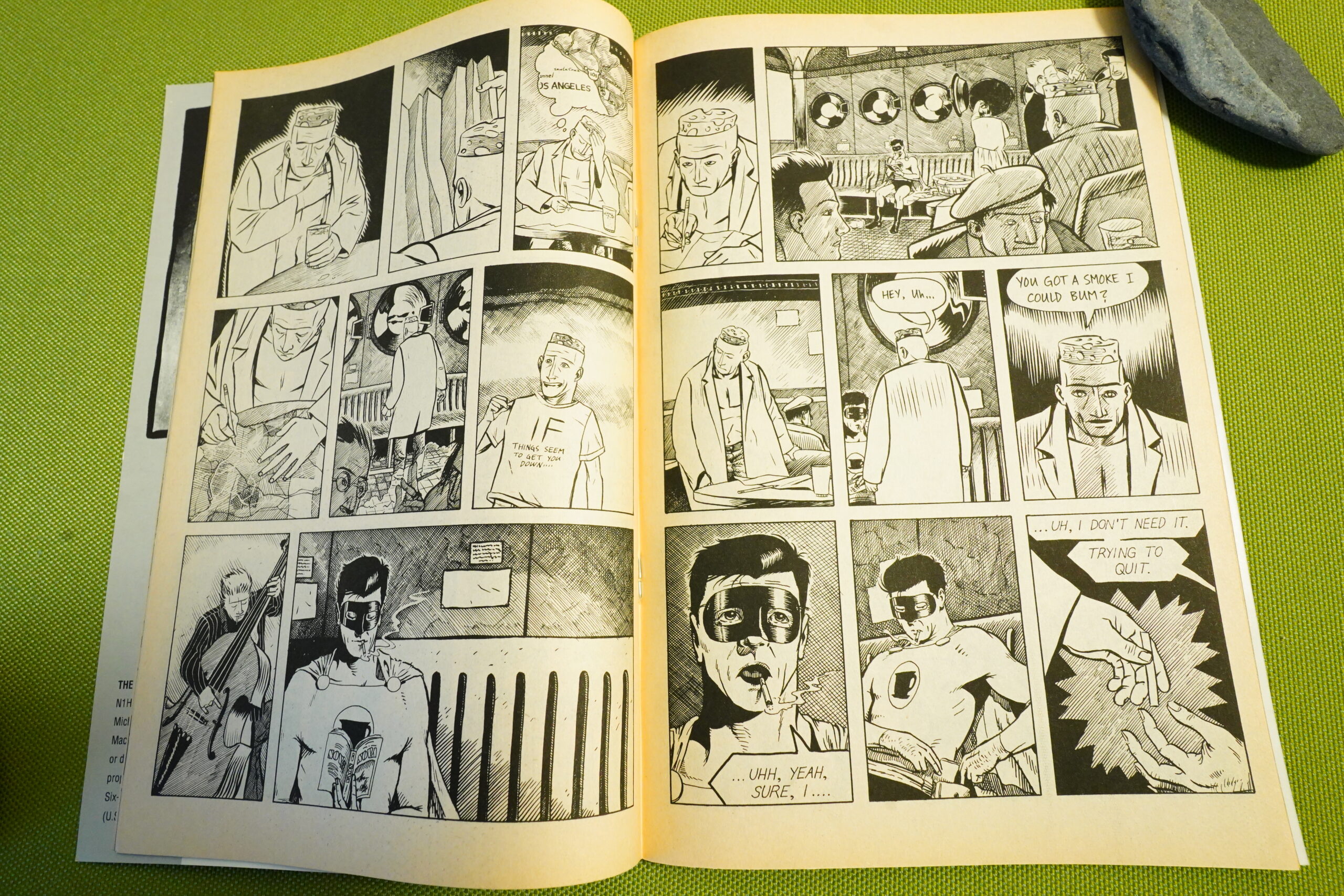
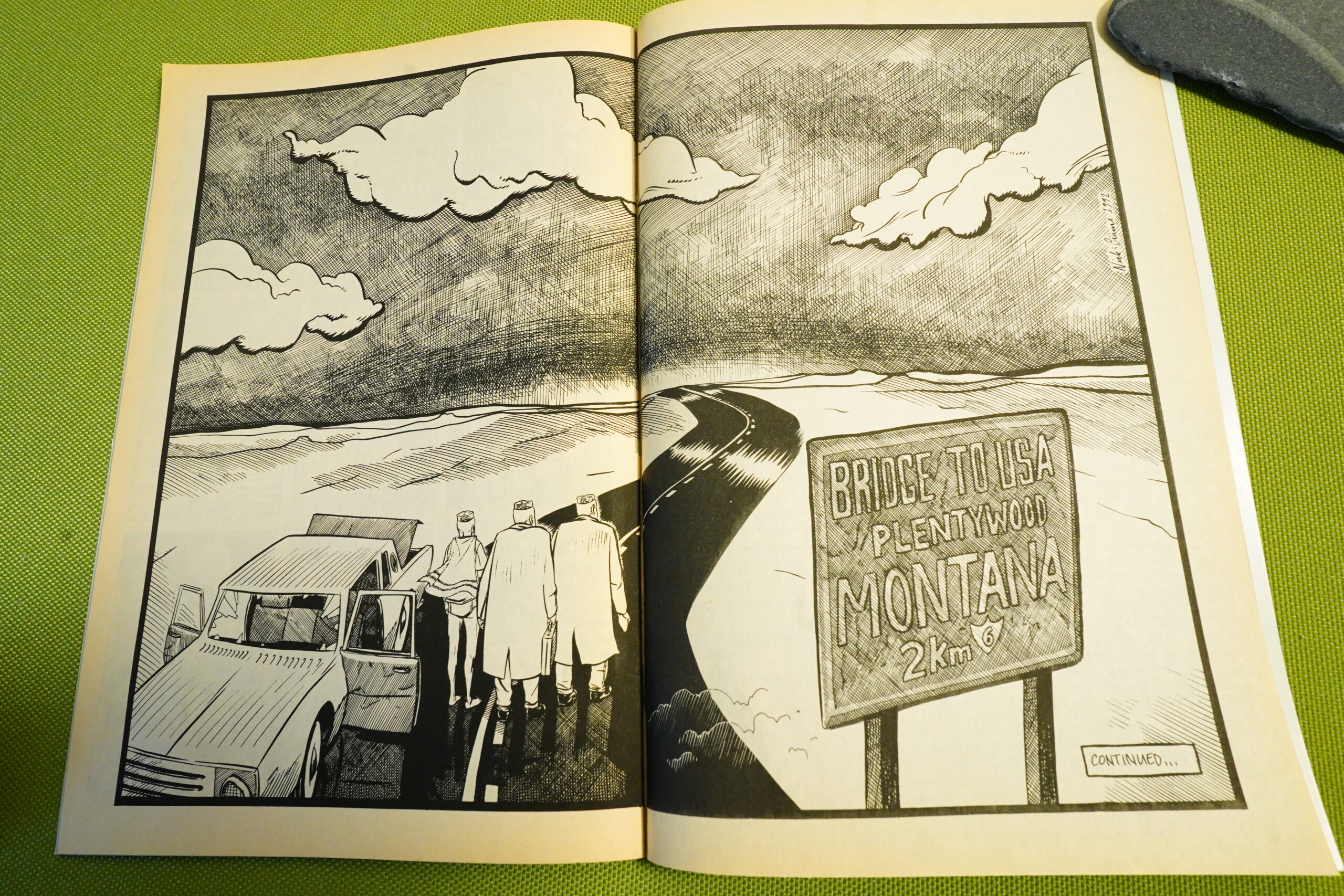
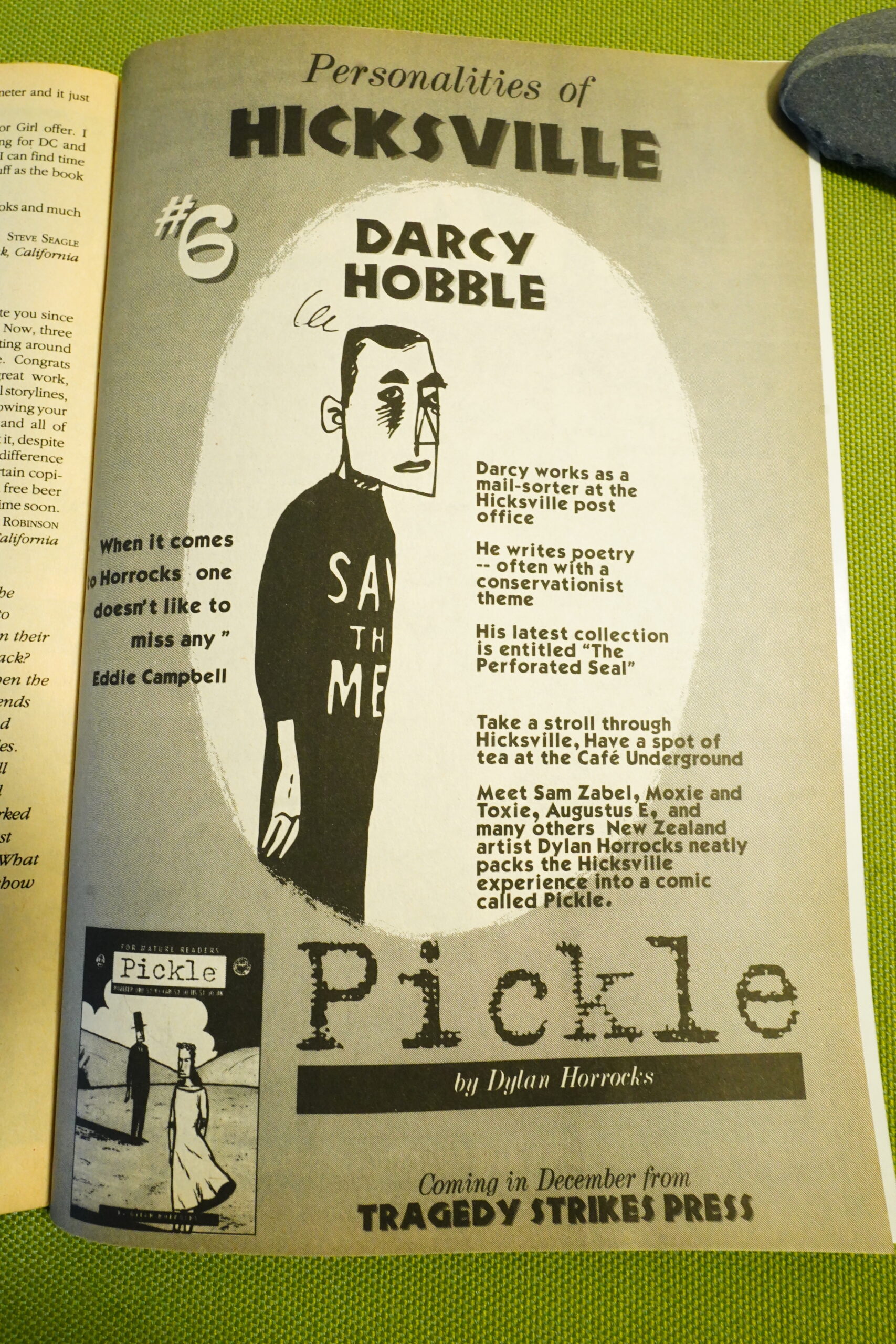
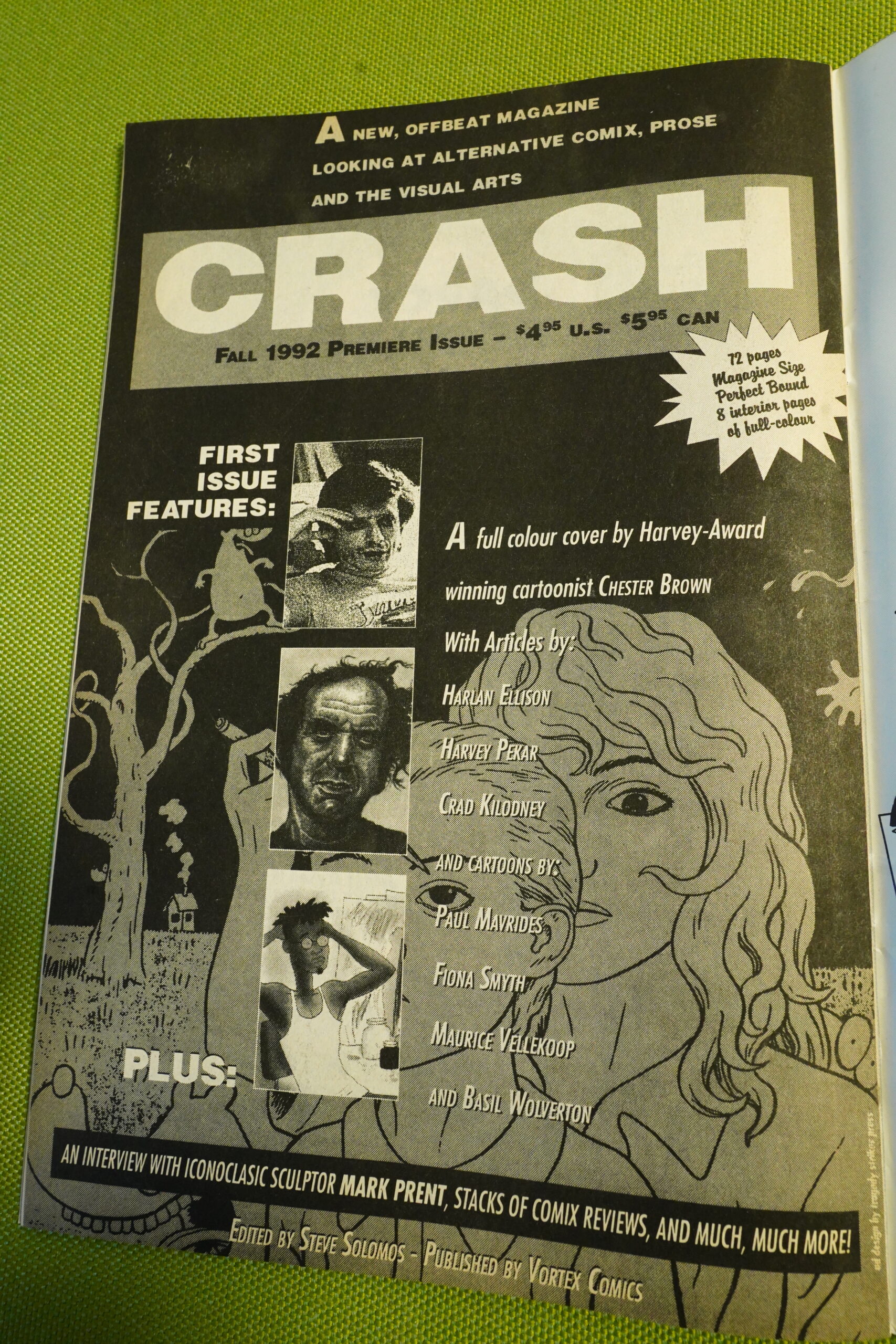
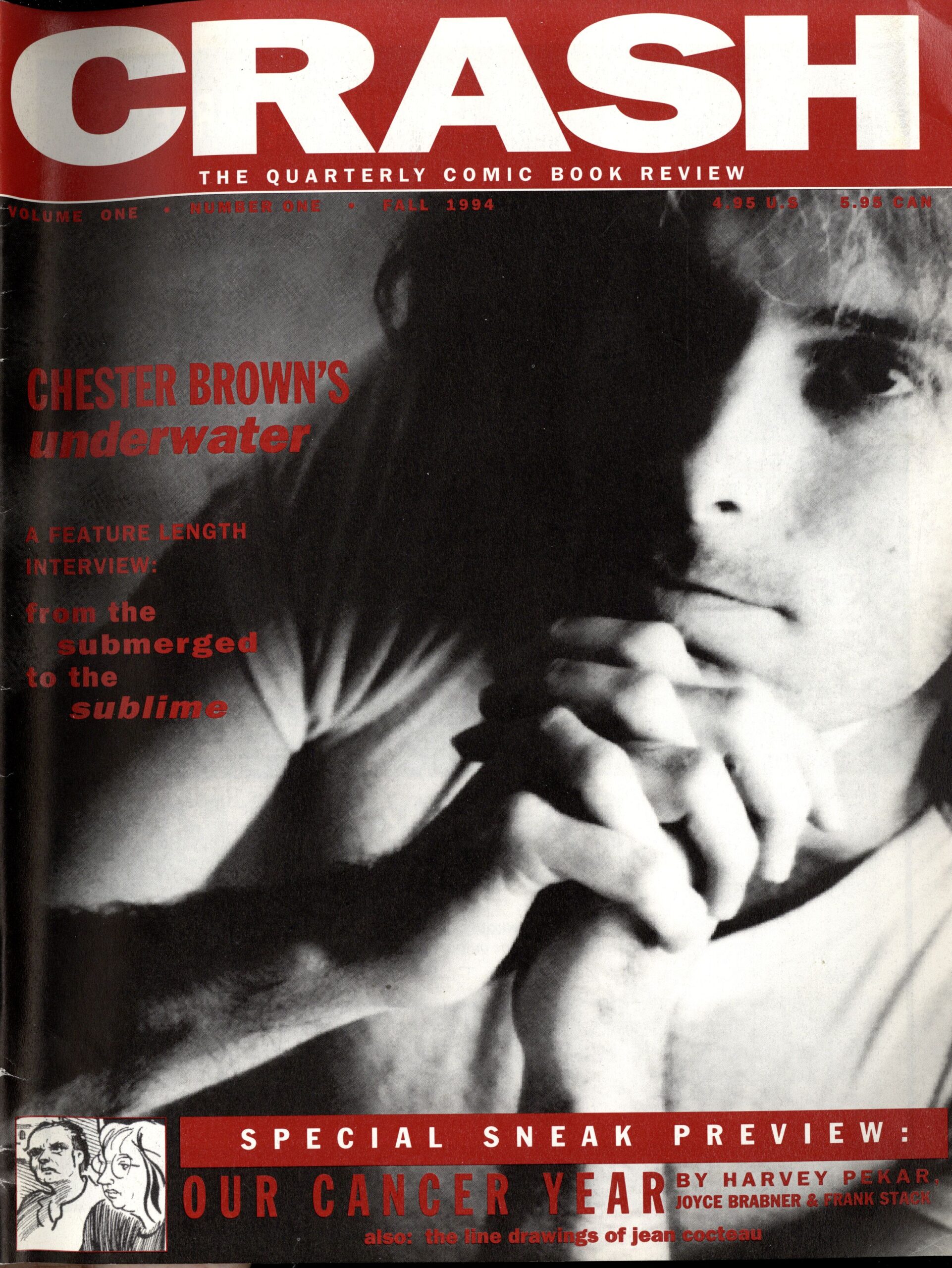
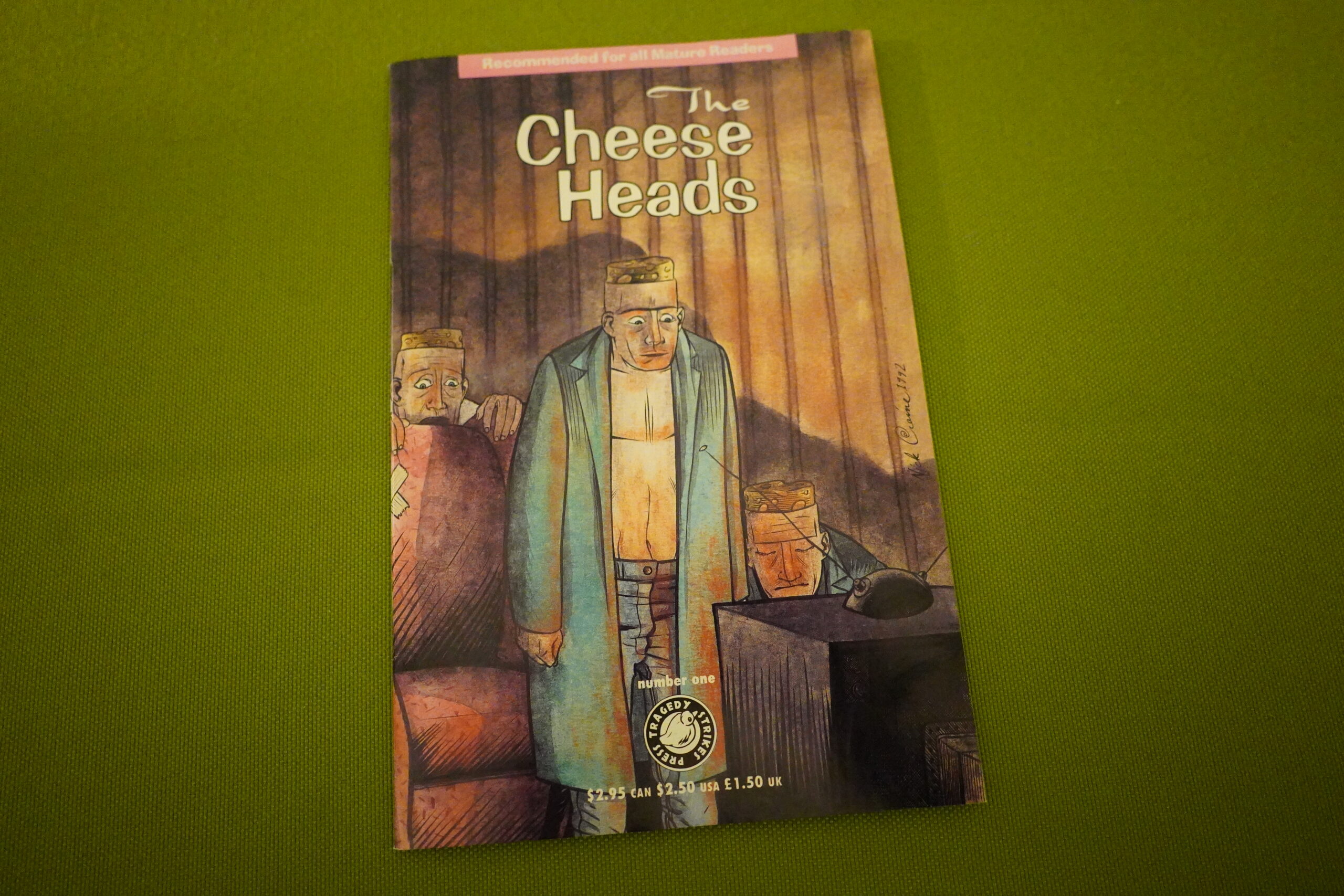
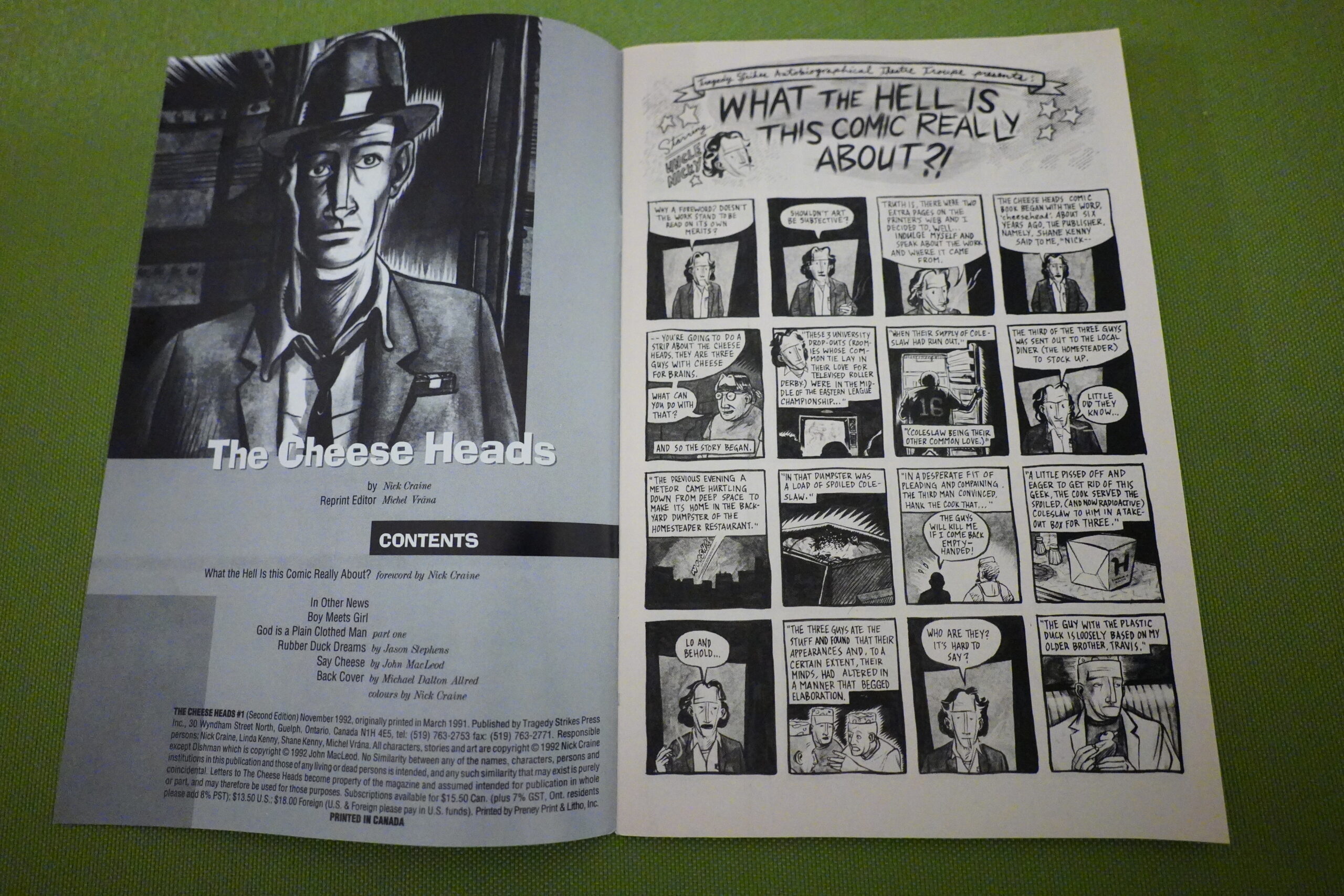
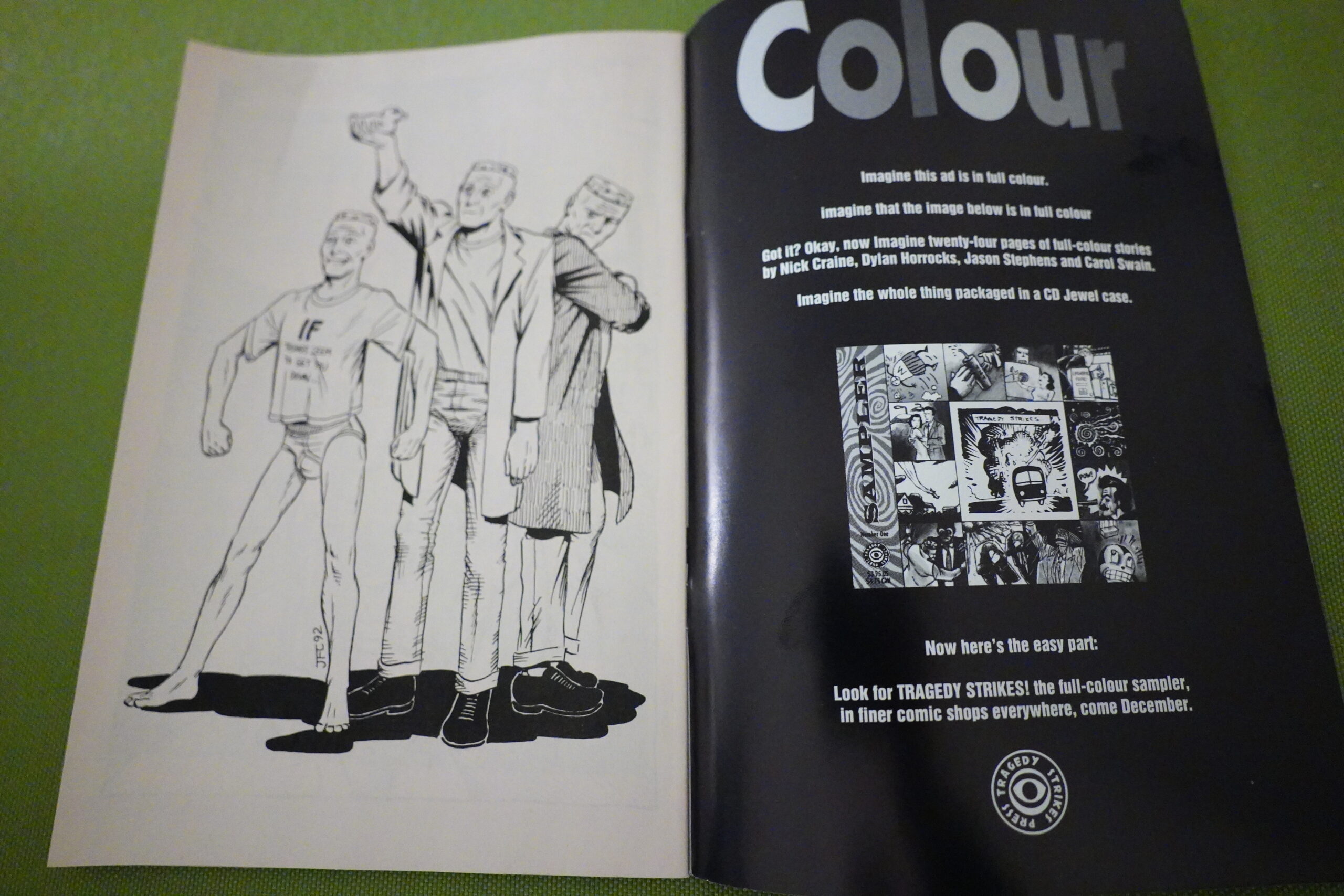
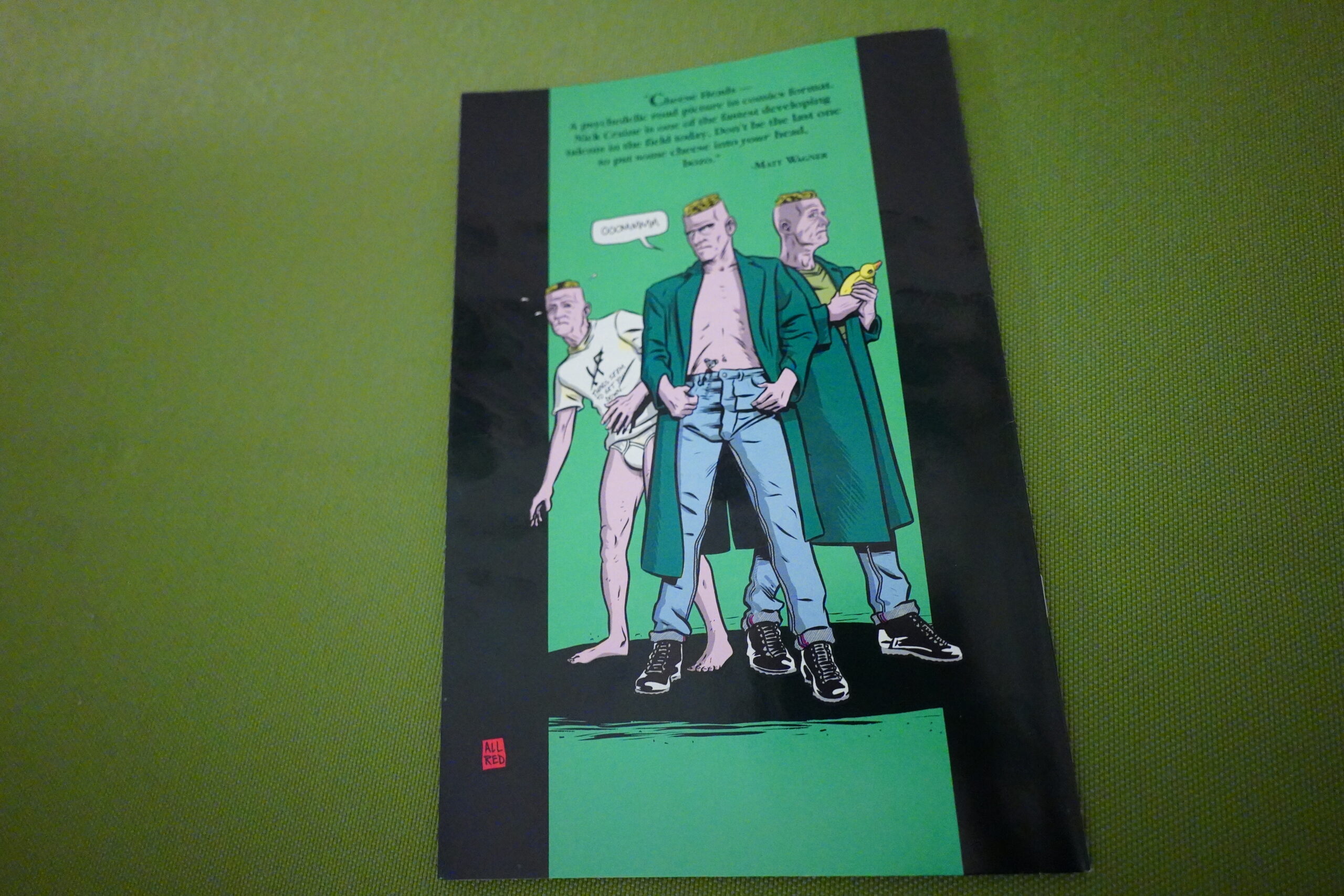
Fantastic look back! I think Nick would agree that it’s the work of someone out of art school! About the reproduction on Carol Swain’s book — that’s how she wanted it done at the time. She would photocopy her carefully done charcoal drawings and submit that as the final artwork. It’s only later that she leaned into reproducing the works closer to the original artwork without a photocopied version as an intermediary step.